Quotes & Sayings About Language And Culture
Enjoy reading and share 100 famous quotes about Language And Culture with everyone.
Top Language And Culture Quotes
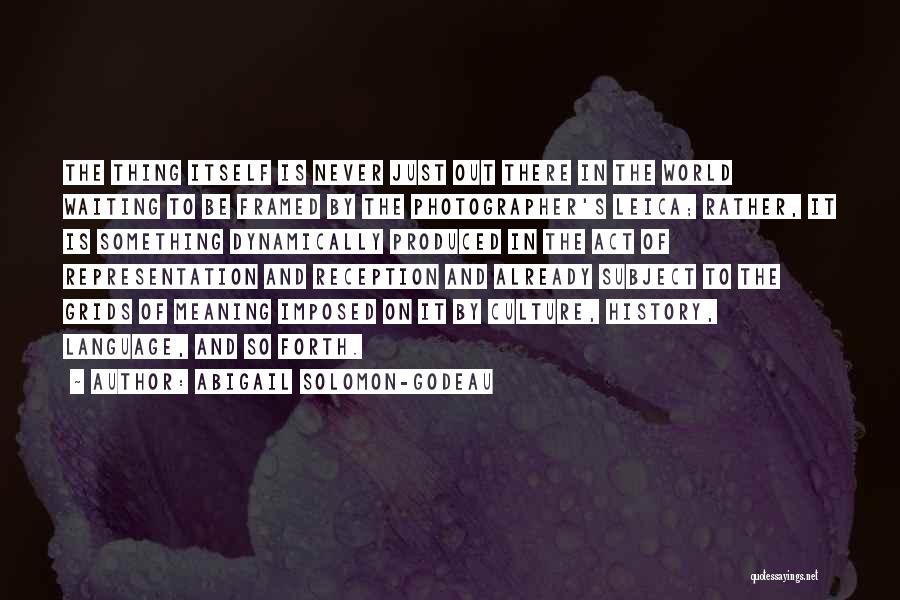
The thing itself is never just out there in the world waiting to be framed by the photographer's Leica; rather, it is something dynamically produced in the act of representation and reception and already subject to the grids of meaning imposed on it by culture, history, language, and so forth. — Abigail Solomon-Godeau
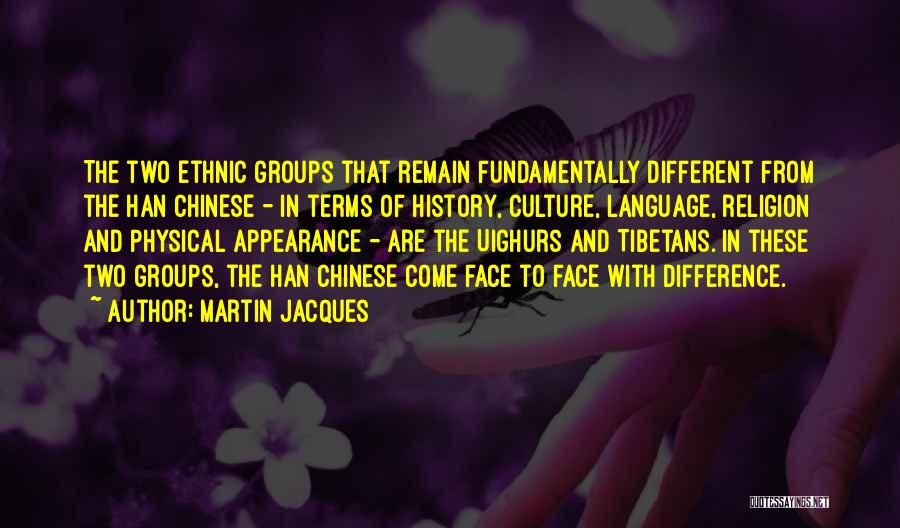
The two ethnic groups that remain fundamentally different from the Han Chinese - in terms of history, culture, language, religion and physical appearance - are the Uighurs and Tibetans. In these two groups, the Han Chinese come face to face with difference. — Martin Jacques
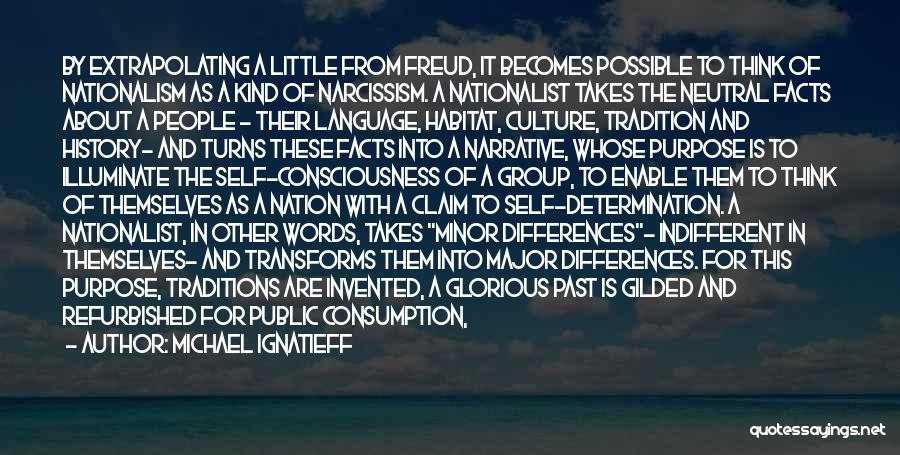
By extrapolating a little from Freud, it becomes possible to think of nationalism as a kind of narcissism. A nationalist takes the neutral facts about a people - their language, habitat, culture, tradition and history- and turns these facts into a narrative, whose purpose is to illuminate the self-consciousness of a group, to enable them to think of themselves as a nation with a claim to self-determination. A nationalist, in other words, takes "minor differences"- indifferent in themselves- and transforms them into major differences. For this purpose, traditions are invented, a glorious past is gilded and refurbished for public consumption, and a people who might not have thought of themselves as a people at all suddenly begin to dream of themselves as a nation. — Michael Ignatieff

The fact is, that for the Huichol, and for all those who refuse, who are in flight, words and things are precisely what language does not speak about. Language is a natural act which implies belonging. He who exists, speaks. He who does not speak, does not exist. He has no place in the world. The Huichol language is Huichol to the same degree as the Huichol earth, the Huichol sky, religion, tattooing, dress, the peyoteros' hat. It is not enough to pronounce the syllables of the Huichol language to be Huichol. That is obvious. — Jean-Marie G. Le Clezio
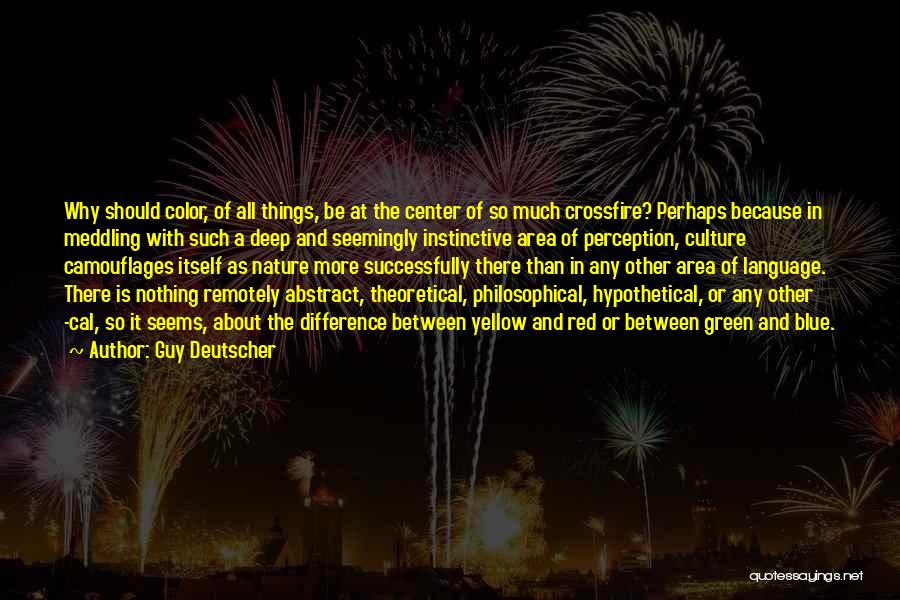
Why should color, of all things, be at the center of so much crossfire? Perhaps because in meddling with such a deep and seemingly instinctive area of perception, culture camouflages itself as nature more successfully there than in any other area of language. There is nothing remotely abstract, theoretical, philosophical, hypothetical, or any other -cal, so it seems, about the difference between yellow and red or between green and blue. — Guy Deutscher
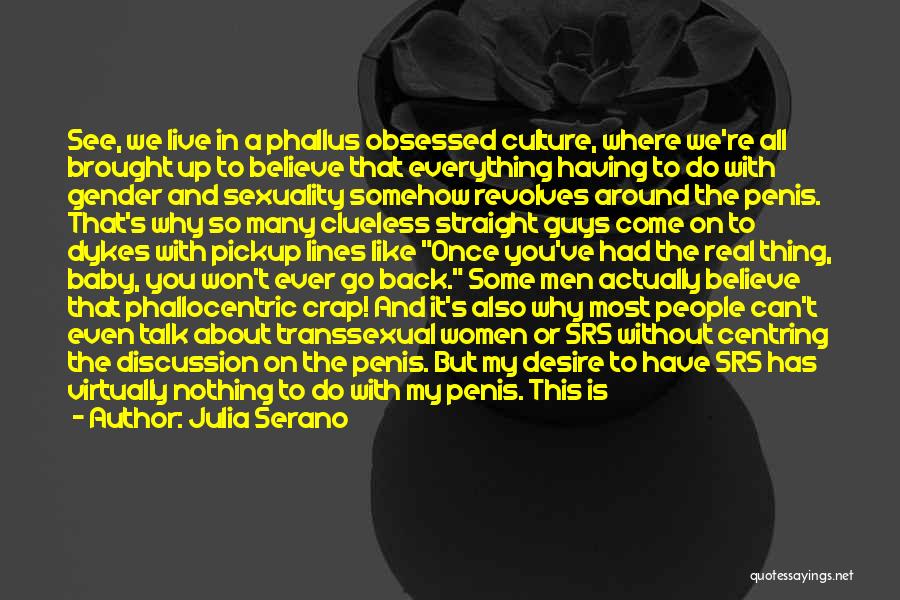
See, we live in a phallus obsessed culture, where we're all brought up to believe that everything having to do with gender and sexuality somehow revolves around the penis. That's why so many clueless straight guys come on to dykes with pickup lines like "Once you've had the real thing, baby, you won't ever go back." Some men actually believe that phallocentric crap! And it's also why most people can't even talk about transsexual women or SRS without centring the discussion on the penis. But my desire to have SRS has virtually nothing to do with my penis. This is about my wanting to have a clitoris and vagina. But we don't even have the language to describe this desire. — Julia Serano

At the limit it could be said that every speaking being has a personal language of his own, that is his own particular way of thinking and feeling. Culture, at its various levels, unifies in a series of strata, to the extent that they come into contact with each other, a greater or lesser number of individuals who understand each other's mode of expression to varying degrees, etc. — Antonio Gramsci

A landscape image cuts across all political and national boundaries, it transcends the constraints of language and culture. — Charlie Waite
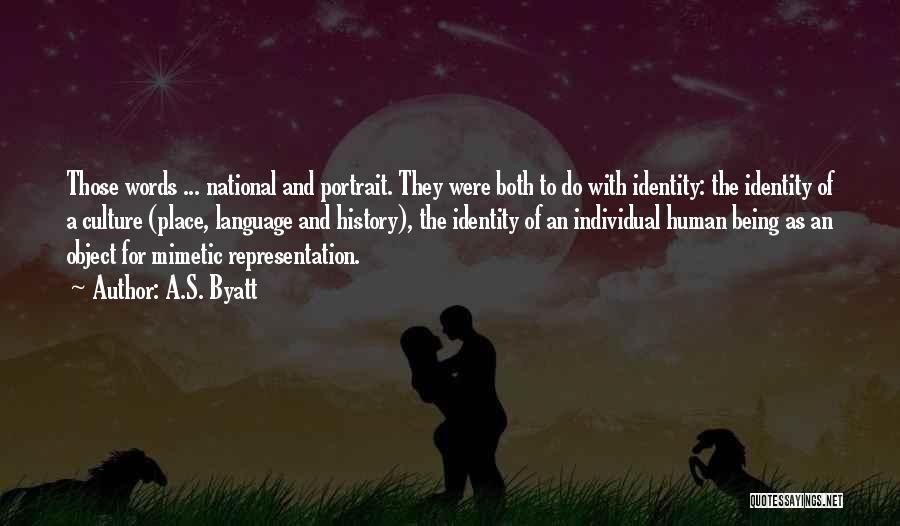
Those words ... national and portrait. They were both to do with identity: the identity of a culture (place, language and history), the identity of an individual human being as an object for mimetic representation. — A.S. Byatt
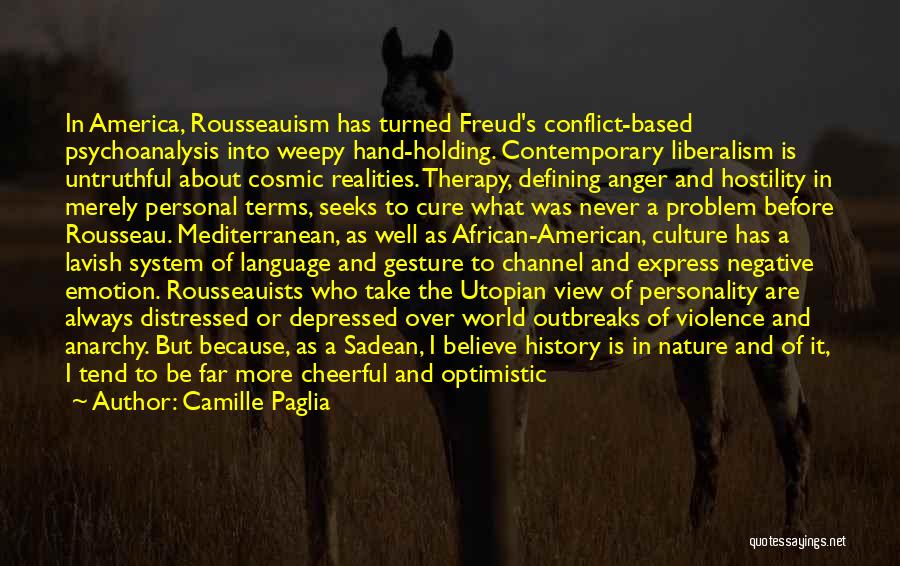
In America, Rousseauism has turned Freud's conflict-based psychoanalysis into weepy hand-holding. Contemporary liberalism is untruthful about cosmic realities. Therapy, defining anger and hostility in merely personal terms, seeks to cure what was never a problem before Rousseau. Mediterranean, as well as African-American, culture has a lavish system of language and gesture to channel and express negative emotion. Rousseauists who take the Utopian view of personality are always distressed or depressed over world outbreaks of violence and anarchy. But because, as a Sadean, I believe history is in nature and of it, I tend to be far more cheerful and optimistic than my liberal friends. Despite crime's omnipresence, things work in society, because biology compels it. Order eventually restores itself, by psychic equilibrium. Films like Seven Samurai (1954) and Two Women (1961) accurately show the breakdown of social controls as a regression to animal-like squalor. — Camille Paglia
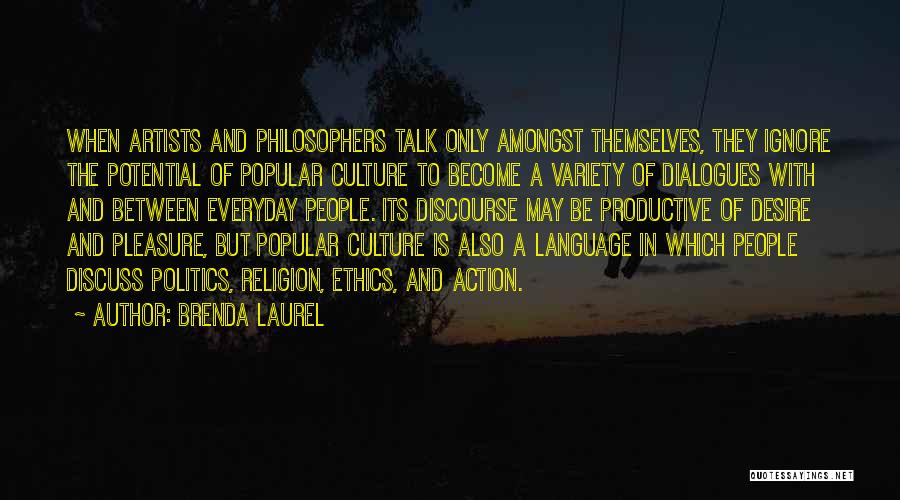
When artists and philosophers talk only amongst themselves, they ignore the potential of popular culture to become a variety of dialogues with and between everyday people. Its discourse may be productive of desire and pleasure, but popular culture is also a language in which people discuss politics, religion, ethics, and action. — Brenda Laurel
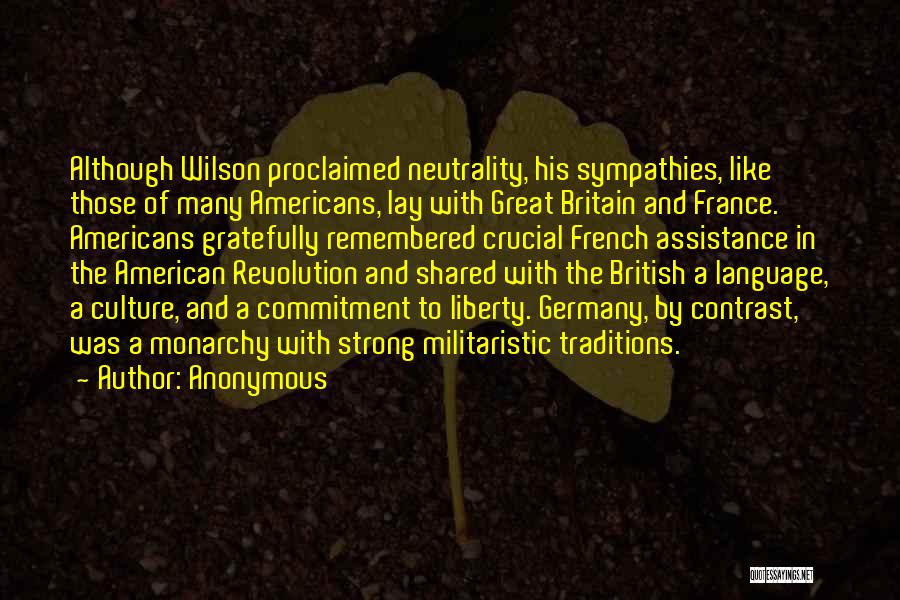
Although Wilson proclaimed neutrality, his sympathies, like those of many Americans, lay with Great Britain and France. Americans gratefully remembered crucial French assistance in the American Revolution and shared with the British a language, a culture, and a commitment to liberty. Germany, by contrast, was a monarchy with strong militaristic traditions. — Anonymous
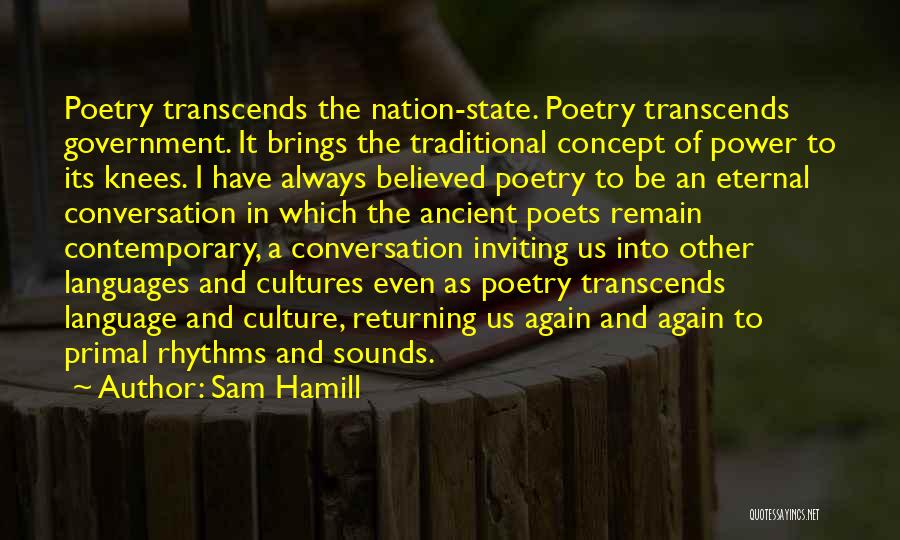
Poetry transcends the nation-state. Poetry transcends government. It brings the traditional concept of power to its knees. I have always believed poetry to be an eternal conversation in which the ancient poets remain contemporary, a conversation inviting us into other languages and cultures even as poetry transcends language and culture, returning us again and again to primal rhythms and sounds. — Sam Hamill

We have to make movies where we do not think this is for the American market or this is for the Chinese market. We have to make a good movie that anyone would just want to sit down and watch because love, language, culture transcend everything. — Michelle Yeoh
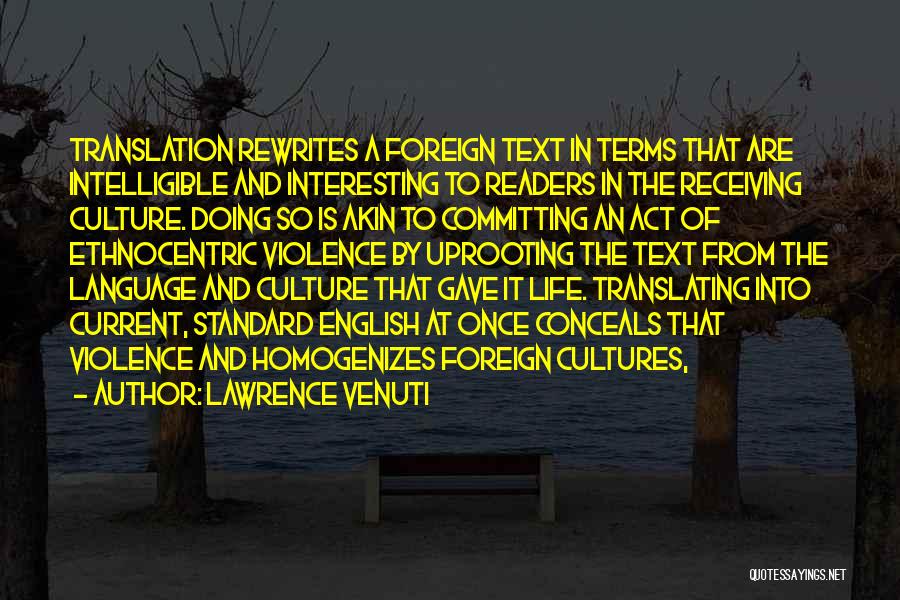
Translation rewrites a foreign text in terms that are intelligible and interesting to readers in the receiving culture. Doing so is akin to committing an act of ethnocentric violence by uprooting the text from the language and culture that gave it life. Translating into current, standard English at once conceals that violence and homogenizes foreign cultures, — Lawrence Venuti
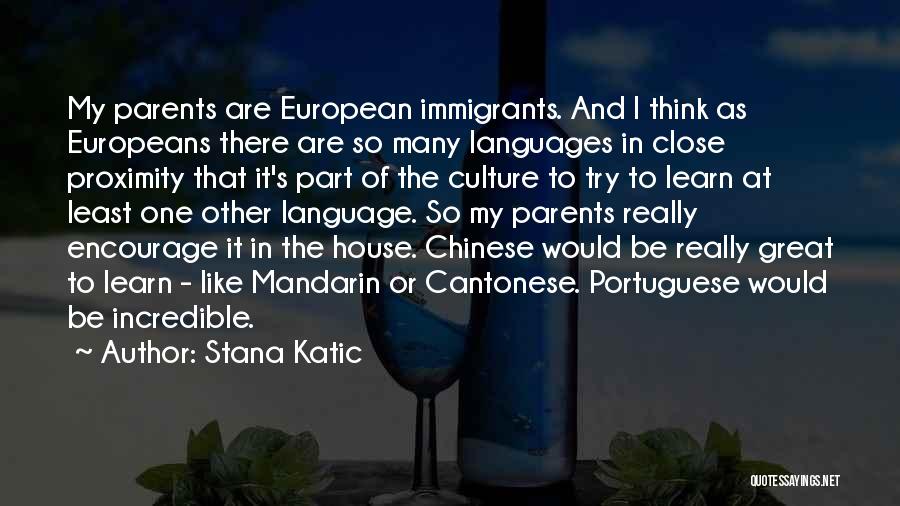
My parents are European immigrants. And I think as Europeans there are so many languages in close proximity that it's part of the culture to try to learn at least one other language. So my parents really encourage it in the house. Chinese would be really great to learn - like Mandarin or Cantonese. Portuguese would be incredible. — Stana Katic
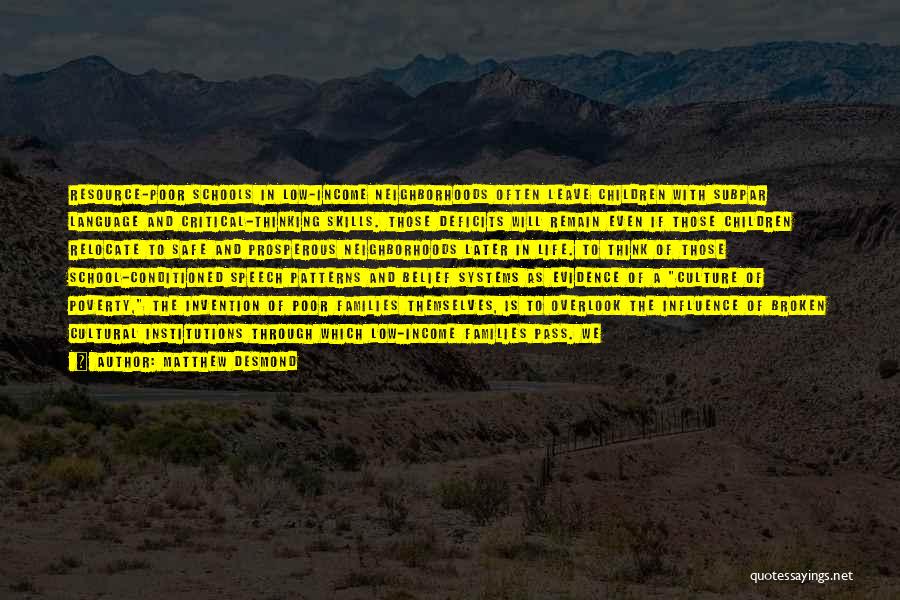
Resource-poor schools in low-income neighborhoods often leave children with subpar language and critical-thinking skills. Those deficits will remain even if those children relocate to safe and prosperous neighborhoods later in life. To think of those school-conditioned speech patterns and belief systems as evidence of a "culture of poverty," the invention of poor families themselves, is to overlook the influence of broken cultural institutions through which low-income families pass. We — Matthew Desmond

I studied Japanese language and culture in college and graduate school, and afterward went to work in Tokyo, where I met a young man whose father was a famous businessman and whose mother was a geisha. He and I never discussed his parentage, which was an open secret, but it fascinated me. — Arthur Golden
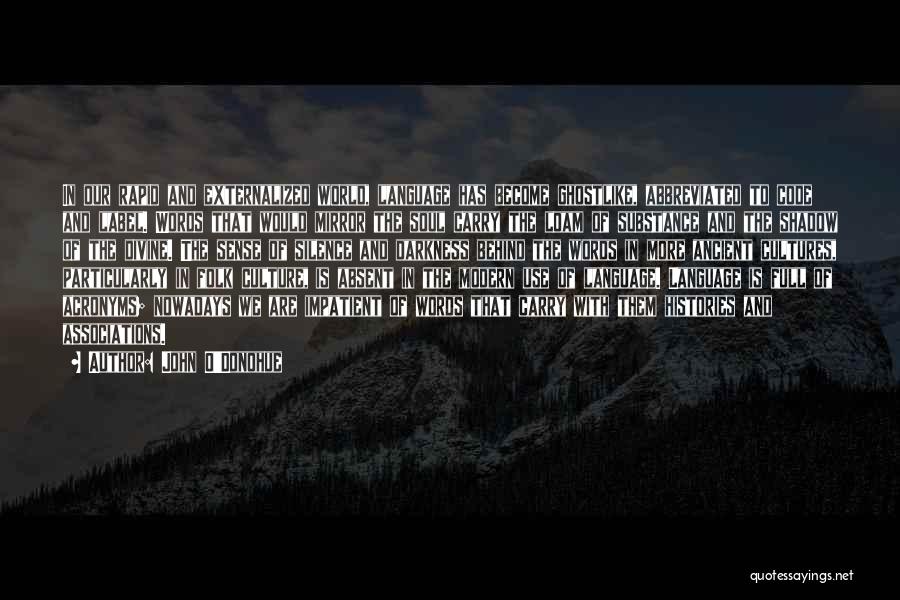
In our rapid and externalized world, language has become ghostlike, abbreviated to code and label. Words that would mirror the soul carry the loam of substance and the shadow of the divine. The sense of silence and darkness behind the words in more ancient cultures, particularly in folk culture, is absent in the modern use of language. Language is full of acronyms; nowadays we are impatient of words that carry with them histories and associations. — John O'Donohue
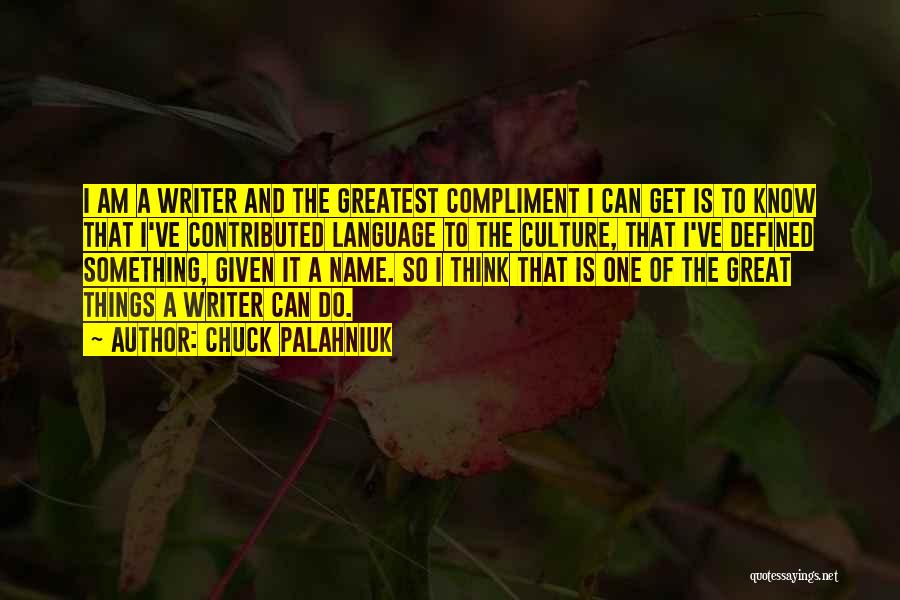
I am a writer and the greatest compliment I can get is to know that I've contributed language to the culture, that I've defined something, given it a name. So I think that is one of the great things a writer can do. — Chuck Palahniuk
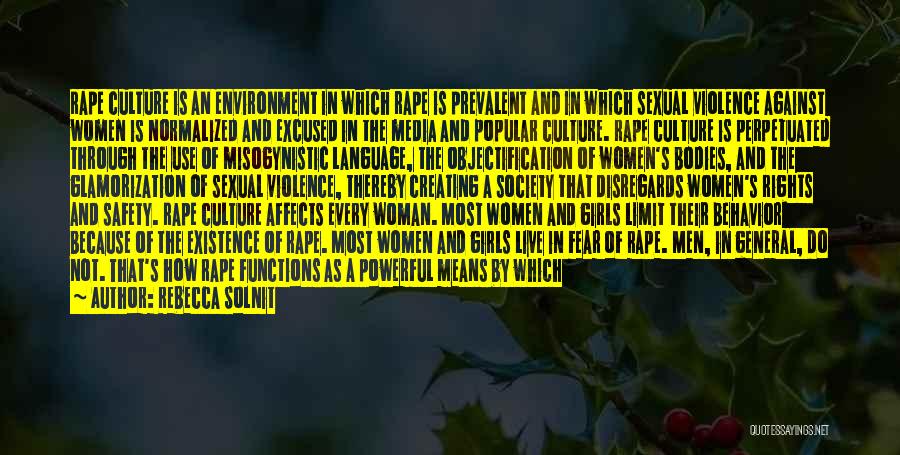
Rape culture is an environment in which rape is prevalent and in which sexual violence against women is normalized and excused in the media and popular culture. Rape culture is perpetuated through the use of misogynistic language, the objectification of women's bodies, and the glamorization of sexual violence, thereby creating a society that disregards women's rights and safety. Rape culture affects every woman. Most women and girls limit their behavior because of the existence of rape. Most women and girls live in fear of rape. Men, in general, do not. That's how rape functions as a powerful means by which the whole female population is held in a subordinate position to the whole male population, even though many men don't rape, and many women are never victims of rape. — Rebecca Solnit
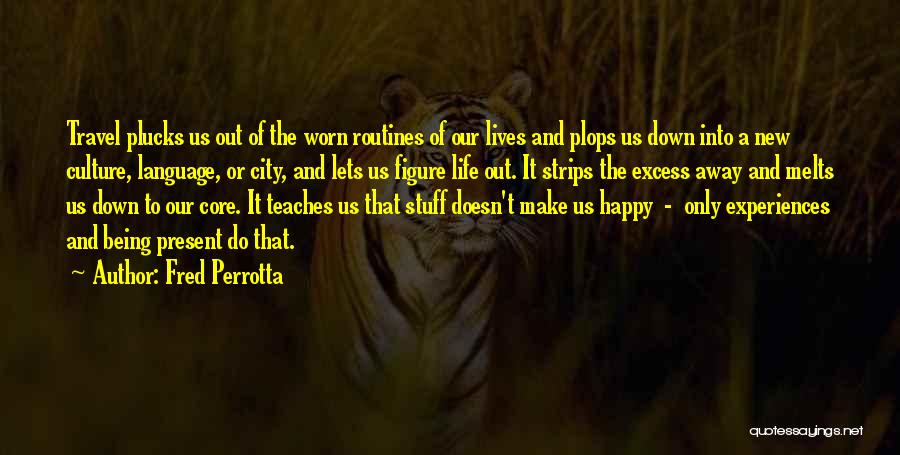
Travel plucks us out of the worn routines of our lives and plops us down into a new culture, language, or city, and lets us figure life out. It strips the excess away and melts us down to our core. It teaches us that stuff doesn't make us happy - only experiences and being present do that. — Fred Perrotta
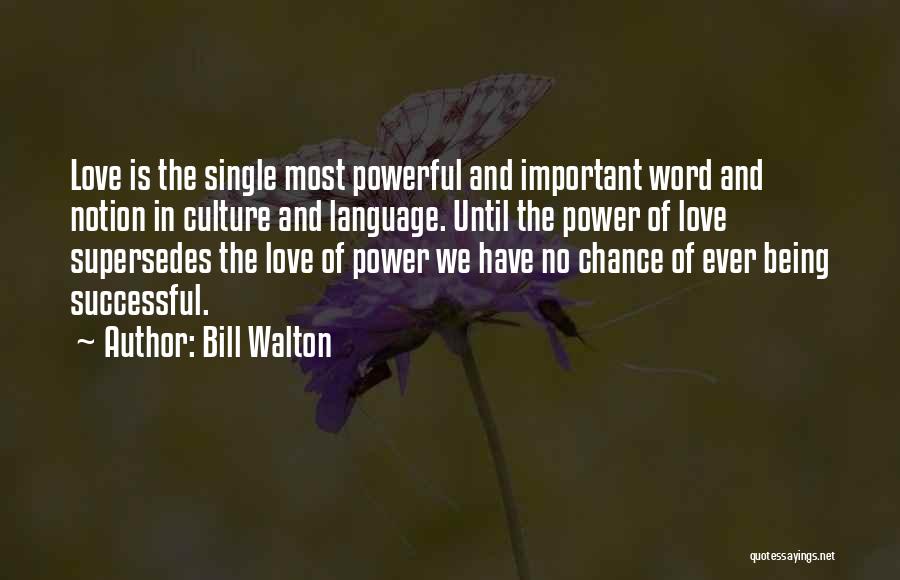
Love is the single most powerful and important word and notion in culture and language. Until the power of love supersedes the love of power we have no chance of ever being successful. — Bill Walton
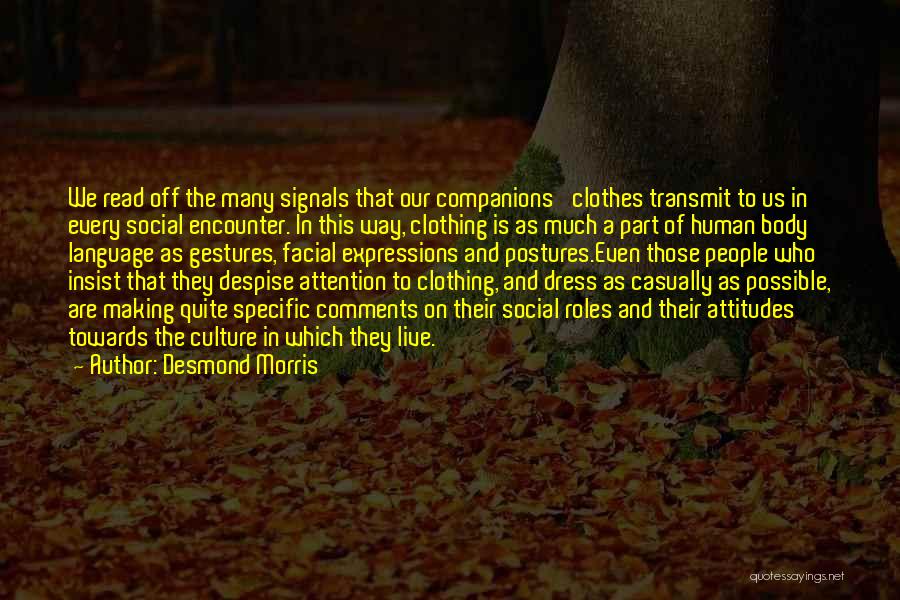
We read off the many signals that our companions' clothes transmit to us in every social encounter. In this way, clothing is as much a part of human body language as gestures, facial expressions and postures.Even those people who insist that they despise attention to clothing, and dress as casually as possible, are making quite specific comments on their social roles and their attitudes towards the culture in which they live. — Desmond Morris
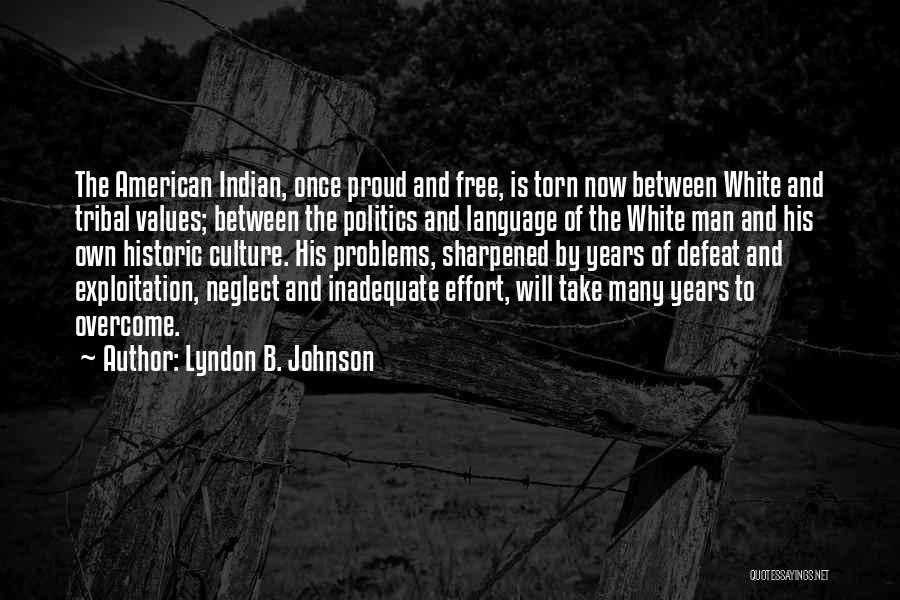
The American Indian, once proud and free, is torn now between White and tribal values; between the politics and language of the White man and his own historic culture. His problems, sharpened by years of defeat and exploitation, neglect and inadequate effort, will take many years to overcome. — Lyndon B. Johnson
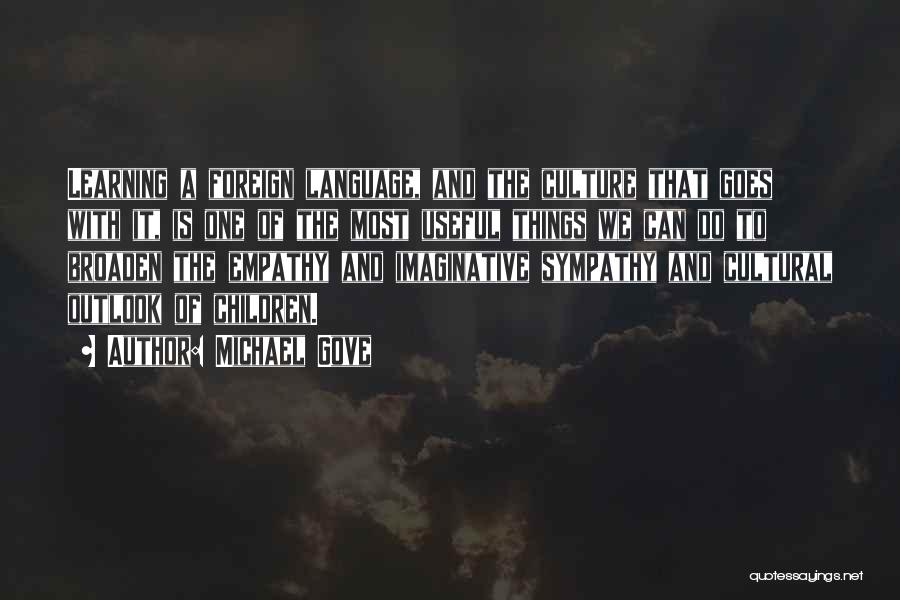
Learning a foreign language, and the culture that goes with it, is one of the most useful things we can do to broaden the empathy and imaginative sympathy and cultural outlook of children. — Michael Gove
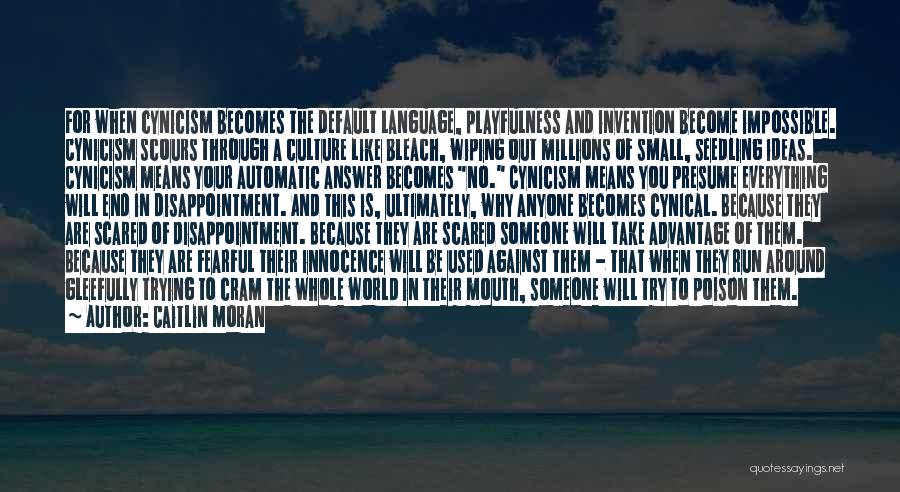
For when cynicism becomes the default language, playfulness and invention become impossible. Cynicism scours through a culture like bleach, wiping out millions of small, seedling ideas. Cynicism means your automatic answer becomes "No." Cynicism means you presume everything will end in disappointment. And this is, ultimately, why anyone becomes cynical. Because they are scared of disappointment. Because they are scared someone will take advantage of them. Because they are fearful their innocence will be used against them - that when they run around gleefully trying to cram the whole world in their mouth, someone will try to poison them. — Caitlin Moran
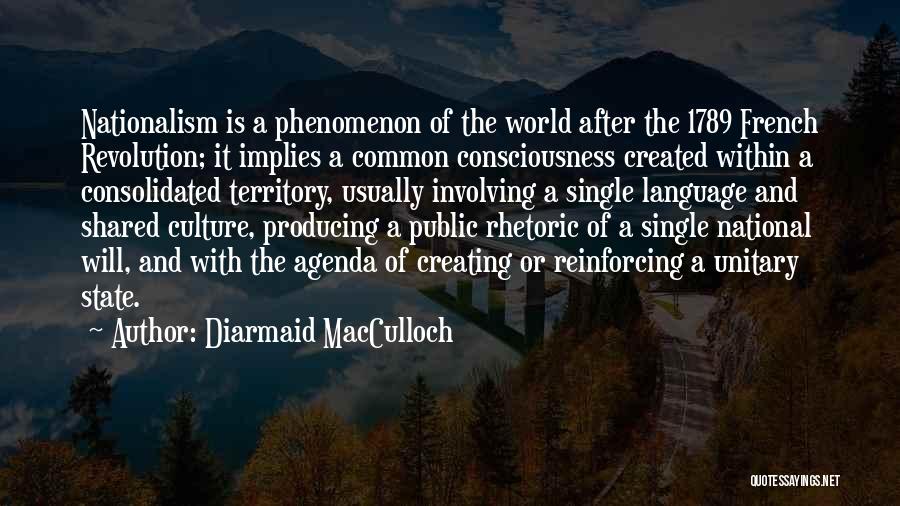
Nationalism is a phenomenon of the world after the 1789 French Revolution; it implies a common consciousness created within a consolidated territory, usually involving a single language and shared culture, producing a public rhetoric of a single national will, and with the agenda of creating or reinforcing a unitary state. — Diarmaid MacCulloch

Everything and anything about a culture can be inferred from the shape of its language - and — Robert A. Heinlein
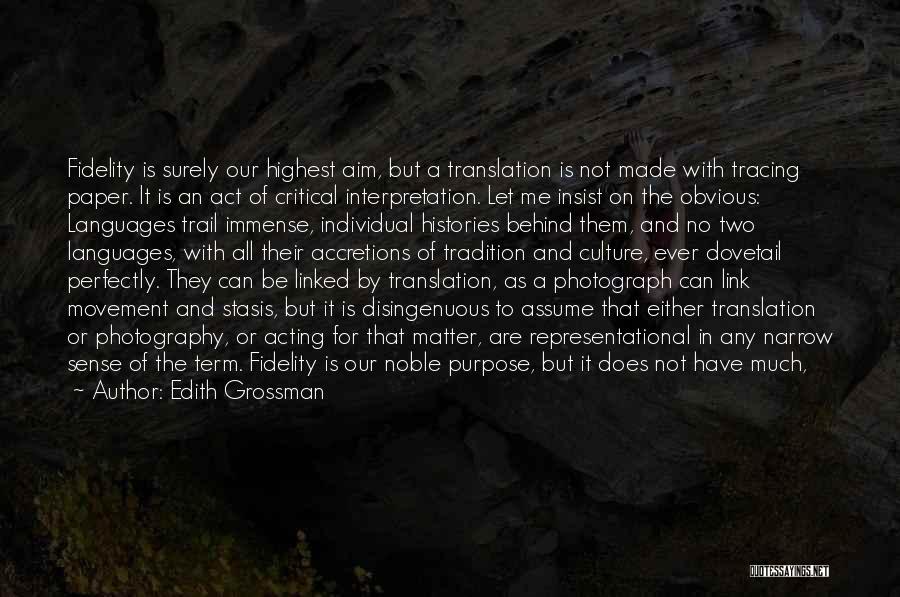
Fidelity is surely our highest aim, but a translation is not made with tracing paper. It is an act of critical interpretation. Let me insist on the obvious: Languages trail immense, individual histories behind them, and no two languages, with all their accretions of tradition and culture, ever dovetail perfectly. They can be linked by translation, as a photograph can link movement and stasis, but it is disingenuous to assume that either translation or photography, or acting for that matter, are representational in any narrow sense of the term. Fidelity is our noble purpose, but it does not have much, if anything, to do with what is called literal meaning. A translation can be faithful to tone and intention, to meaning. It can rarely be faithful to words or syntax, for these are peculiar to specific languages and are not transferable. — Edith Grossman

You know, when it was done originally, they always had to fight to keep it going at the end of each season. Now, The Odd Couple has become part of our language and culture. — Brett Somers

He told us that he had made a mistake by leaving the word love out of the Pyramid of Success. And that love is the single most powerful and important word in our language and culture. And until we allow the power of love to supersede the love of power, none of us has any chance of success at all. There — Bill Walton
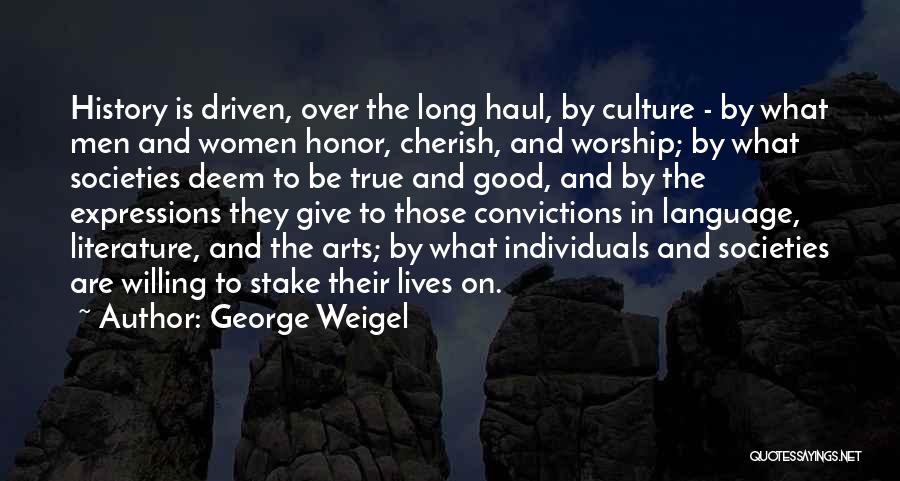
History is driven, over the long haul, by culture - by what men and women honor, cherish, and worship; by what societies deem to be true and good, and by the expressions they give to those convictions in language, literature, and the arts; by what individuals and societies are willing to stake their lives on. — George Weigel
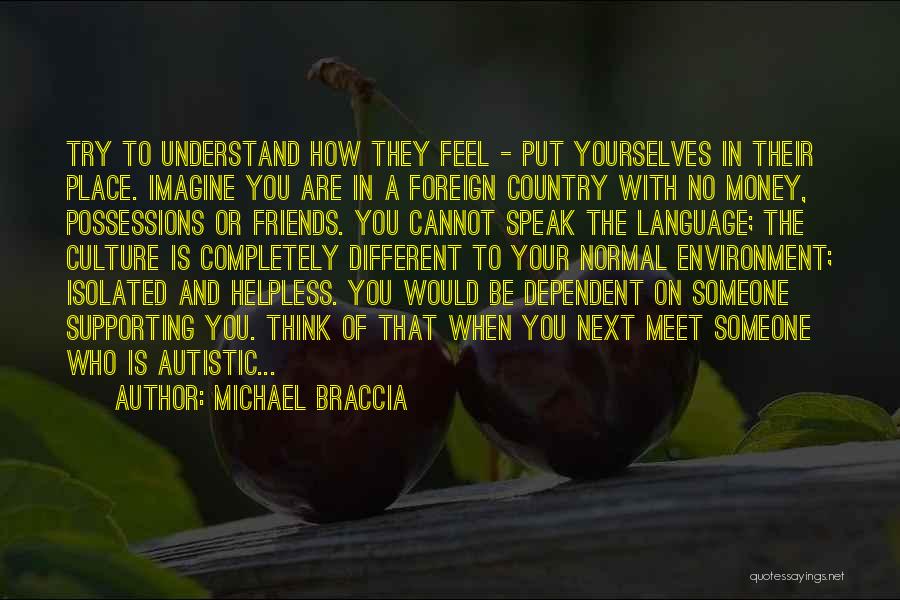
Try to understand how they feel - put yourselves in their place. Imagine you are in a foreign country with no money, possessions or friends. You cannot speak the language; the culture is completely different to your normal environment; isolated and helpless. You would be dependent on someone supporting you. Think of that when you next meet someone who is autistic... — Michael Braccia
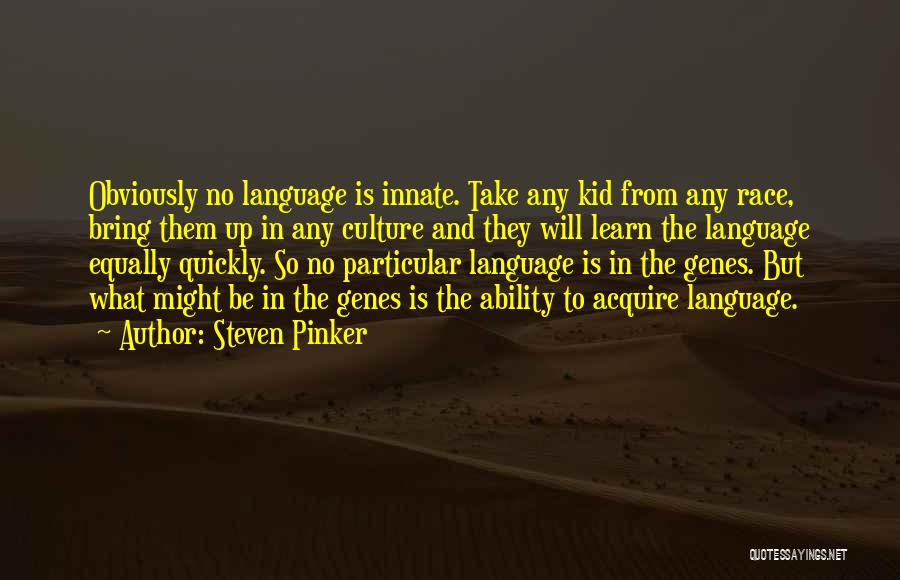
Obviously no language is innate. Take any kid from any race, bring them up in any culture and they will learn the language equally quickly. So no particular language is in the genes. But what might be in the genes is the ability to acquire language. — Steven Pinker
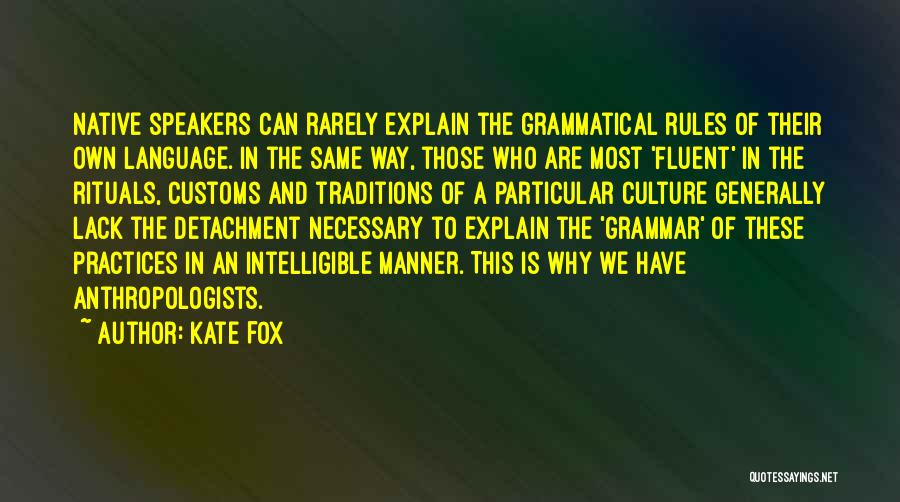
Native speakers can rarely explain the grammatical rules of their own language. In the same way, those who are most 'fluent' in the rituals, customs and traditions of a particular culture generally lack the detachment necessary to explain the 'grammar' of these practices in an intelligible manner. This is why we have anthropologists. — Kate Fox

We celebrate Thanksgiving along with the rest of America, maybe in different ways and for different reasons. Despite everything that's happened to us since we fed the Pilgrims, we still have our language, our culture, our distinct social system. Even in a nuclear age, we still have a tribal people. — Wilma Mankiller
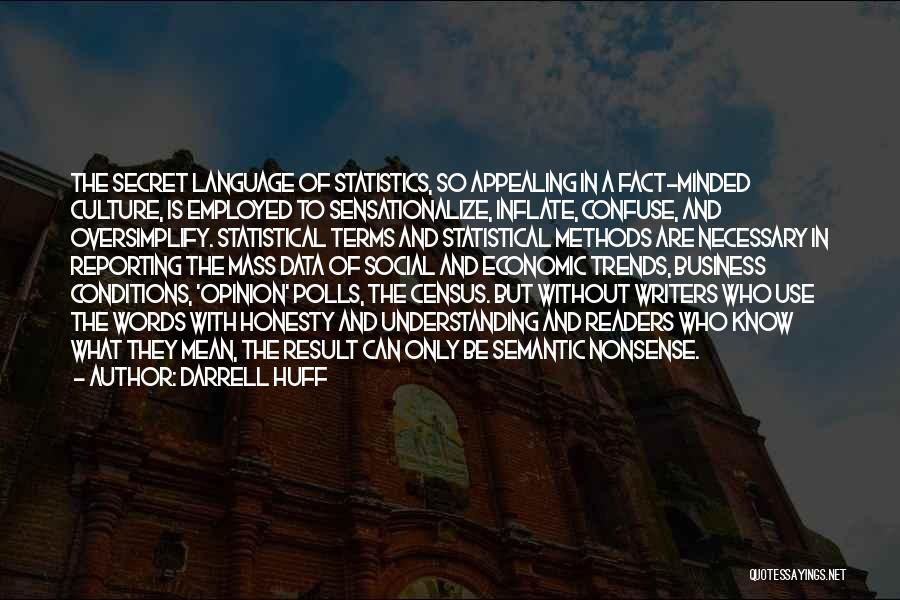
The secret language of statistics, so appealing in a fact-minded culture, is employed to sensationalize, inflate, confuse, and oversimplify. Statistical terms and statistical methods are necessary in reporting the mass data of social and economic trends, business conditions, 'opinion' polls, the census. But without writers who use the words with honesty and understanding and readers who know what they mean, the result can only be semantic nonsense. — Darrell Huff
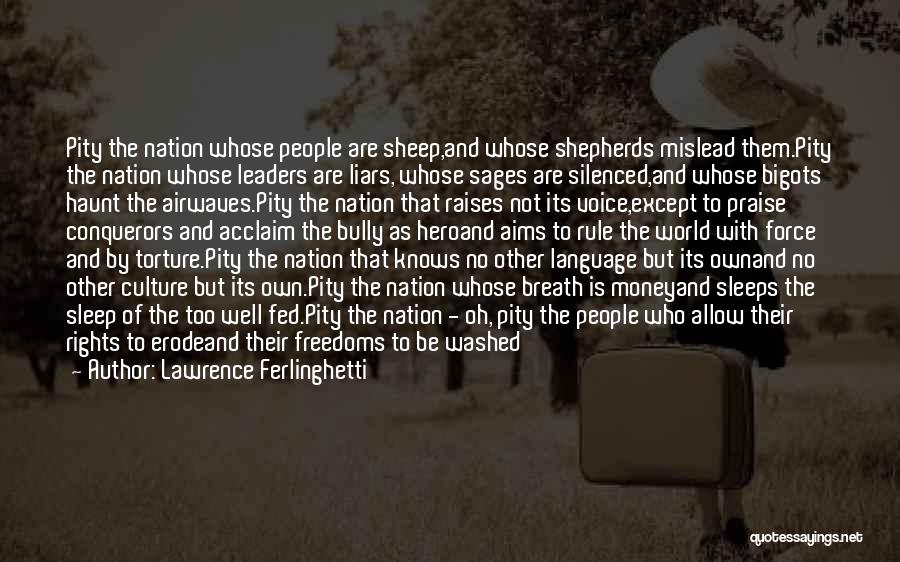
Pity the nation whose people are sheep,
and whose shepherds mislead them.
Pity the nation whose leaders are liars, whose sages are silenced,
and whose bigots haunt the airwaves.
Pity the nation that raises not its voice,
except to praise conquerors and acclaim the bully as hero
and aims to rule the world with force and by torture.
Pity the nation that knows no other language but its own
and no other culture but its own.
Pity the nation whose breath is money
and sleeps the sleep of the too well fed.
Pity the nation - oh, pity the people who allow their rights to erode
and their freedoms to be washed away.
My country, tears of thee, sweet land of liberty. — Lawrence Ferlinghetti

After learning the language and culture of the Chinese people, these Jesuits began to establish contacts with the young intellectuals of the country. — Hu Shih
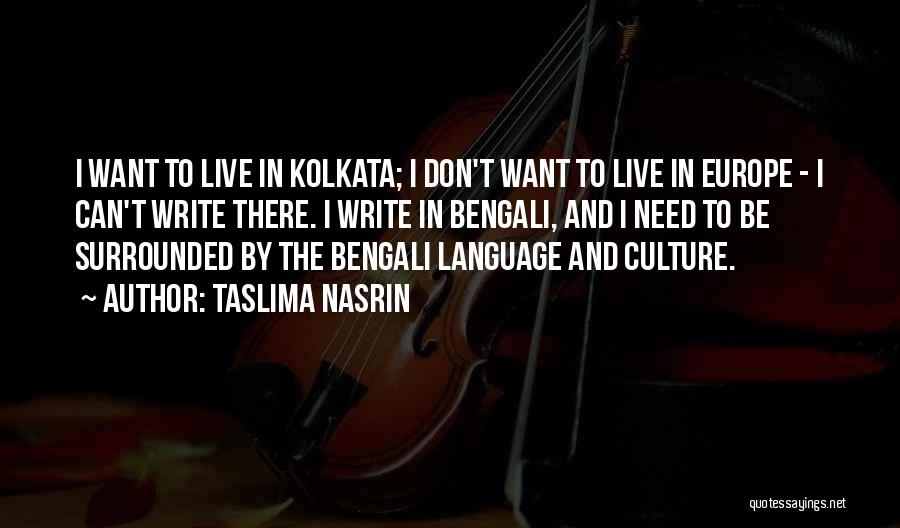
I want to live in Kolkata; I don't want to live in Europe - I can't write there. I write in Bengali, and I need to be surrounded by the Bengali language and culture. — Taslima Nasrin
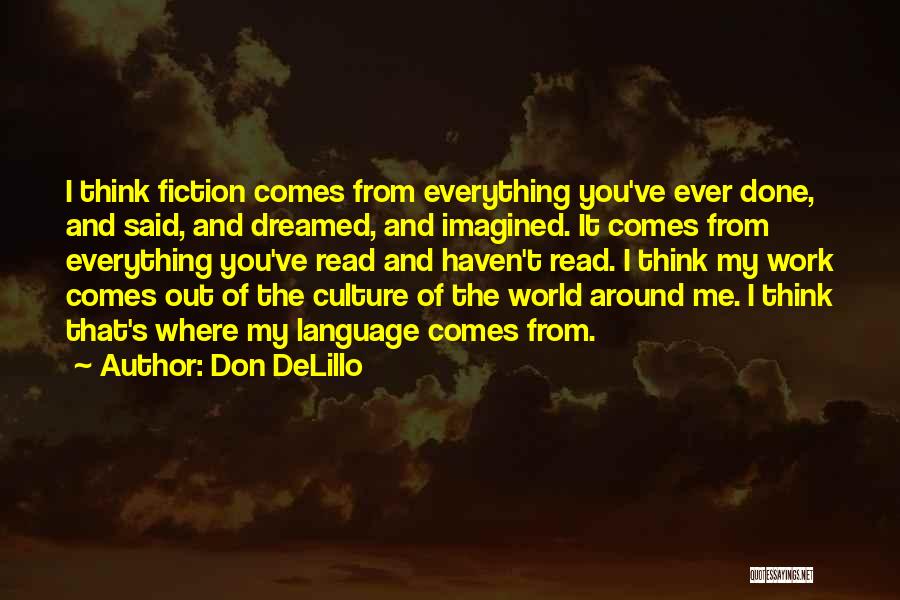
I think fiction comes from everything you've ever done, and said, and dreamed, and imagined. It comes from everything you've read and haven't read. I think my work comes out of the culture of the world around me. I think that's where my language comes from. — Don DeLillo
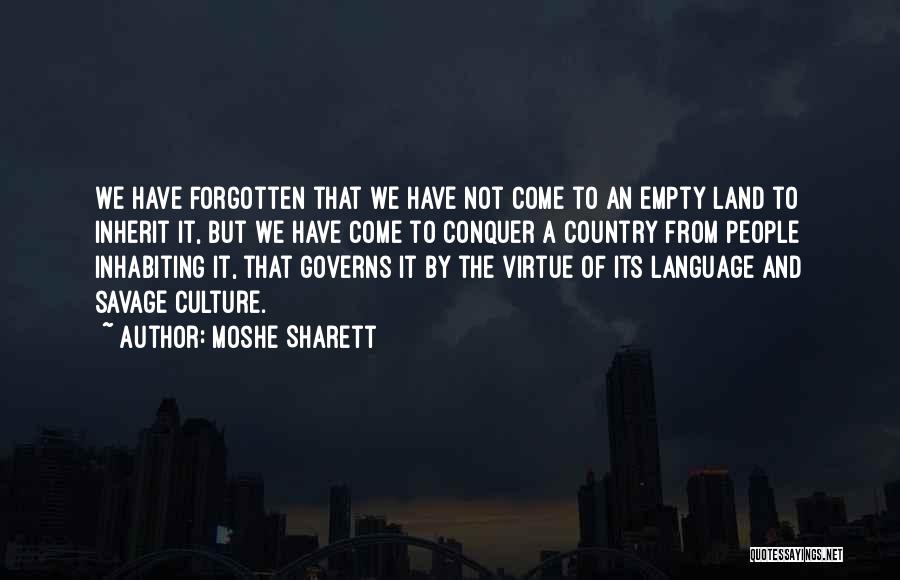
We have forgotten that we have not come to an empty land to inherit it, but we have come to conquer a country from people inhabiting it, that governs it by the virtue of its language and savage culture. — Moshe Sharett

Text of pleasure: the text that contents, fills, grants euphoria; the text that comes from culture and does not break with it, is linked to a comfortable practice of reading.
Text of bliss: the text that imposes a state of loss, the text that discomforts (perhaps to the point of a certain
boredom), unsettles the reader's historical, cultural, psychological assumptions, the consistency of his tastes, values, memories, brings to a crisis his relation with language.
Now the subject who keeps the two texts in his field and in his hands the reins of pleasure and bliss is an anachronic subject, for he simultaneously and contradictorily participates in the profound hedonism of all culture (which permeates him quietly under the cover of an "art de vivre" shared by the old books) and in the destruction of that culture: he enjoys the consistency of his selfhood (that is his pleasure) and seeks its loss (that is his bliss). He is a subject split twice over, doubly perverse. — Roland Barthes

But one may acquire what MacIntyre calls a "second first language," a language which is learned in the same way that a child learns to use the native tongue. A missionary or an anthropologist who really hopes to understand and enter into the adopted culture will not do so by trying to learn the language in the way a tourist uses a phrasebook and a dictionary. — Lesslie Newbigin
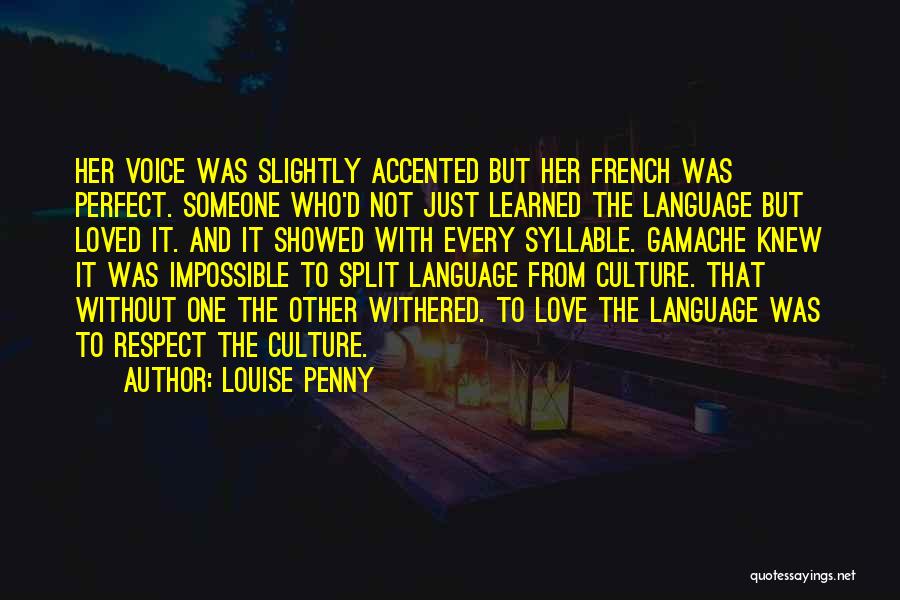
Her voice was slightly accented but her French was perfect. Someone who'd not just learned the language but loved it. And it showed with every syllable. Gamache knew it was impossible to split language from culture. That without one the other withered. To love the language was to respect the culture. — Louise Penny
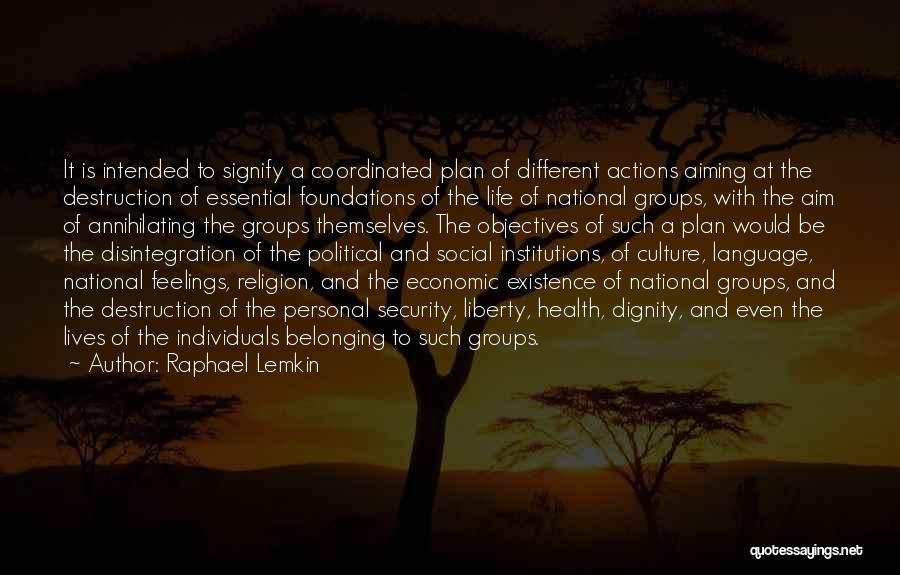
It is intended to signify a coordinated plan of different actions aiming at the destruction of essential foundations of the life of national groups, with the aim of annihilating the groups themselves. The objectives of such a plan would be the disintegration of the political and social institutions, of culture, language, national feelings, religion, and the economic existence of national groups, and the destruction of the personal security, liberty, health, dignity, and even the lives of the individuals belonging to such groups. — Raphael Lemkin
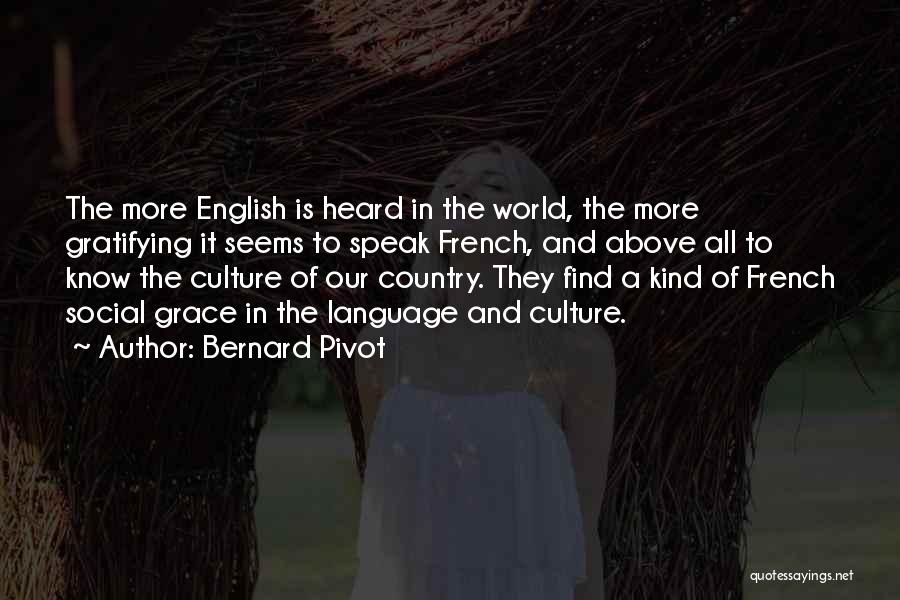
The more English is heard in the world, the more gratifying it seems to speak French, and above all to know the culture of our country. They find a kind of French social grace in the language and culture. — Bernard Pivot
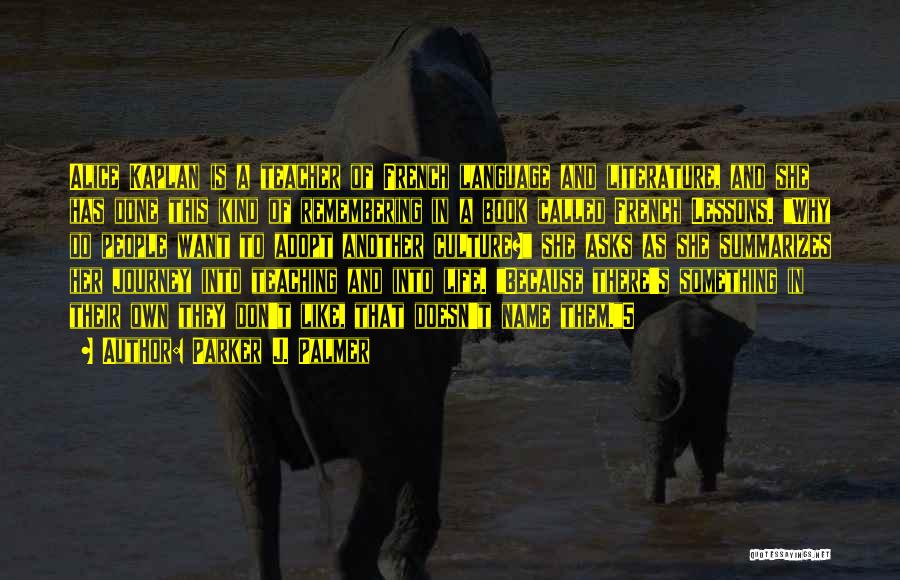
Alice Kaplan is a teacher of French language and literature, and she has done this kind of remembering in a book called French Lessons. "Why do people want to adopt another culture?" she asks as she summarizes her journey into teaching and into life. "Because there's something in their own they don't like, that doesn't name them."5 — Parker J. Palmer
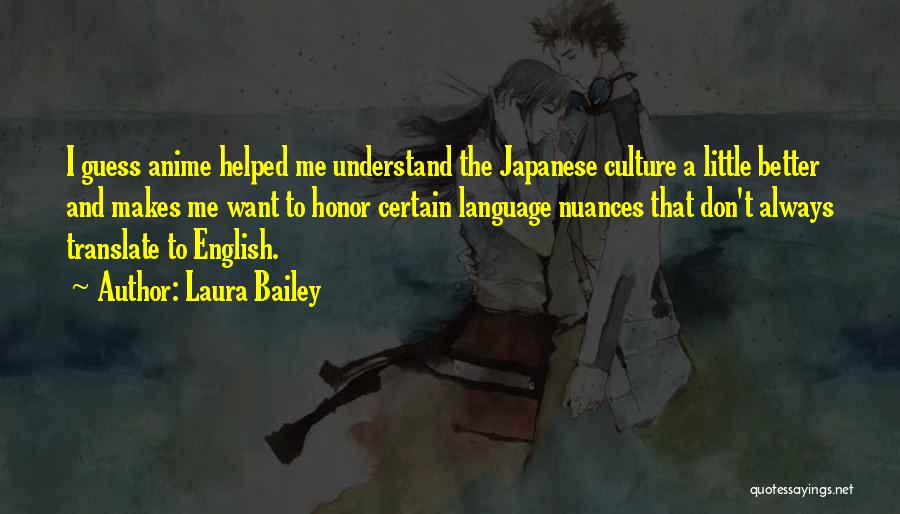
I guess anime helped me understand the Japanese culture a little better and makes me want to honor certain language nuances that don't always translate to English. — Laura Bailey
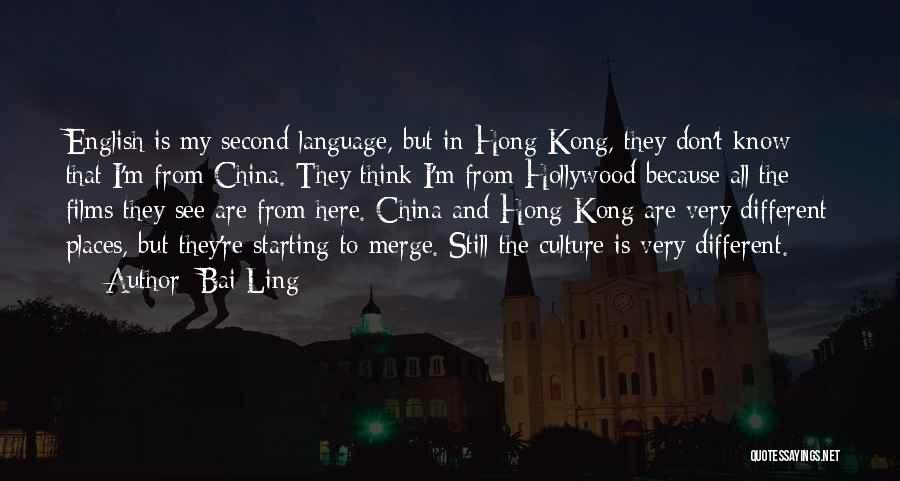
English is my second language, but in Hong Kong, they don't know that I'm from China. They think I'm from Hollywood because all the films they see are from here. China and Hong Kong are very different places, but they're starting to merge. Still the culture is very different. — Bai Ling

There is hardly any political question in the United States that sooner or later does not turn into a judicial question. From that, the obligation that the parties find in their daily polemics to borrow ideas and language from the judicial system. Since most public men are or have formerly been jurists, they make the habits and the turn of ideas that belong to jurists pass into the handling of public affairs. The jury ends up by familiarizing all classes with them. Thus, judicial language becomes, in a way, the common language; so the spirit of the jurist, born inside the schools and courtrooms, spreads little by little beyond their confines; it infiltrates all of society, so to speak; it descends to the lowest ranks, and the entire people finishes by acquiring a part of the habits and tastes of the magistrate. — Alexis De Tocqueville
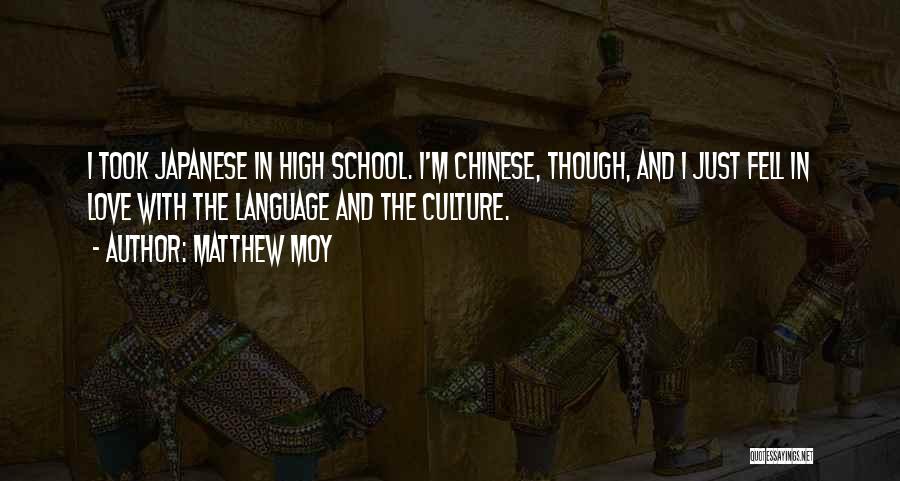
I took Japanese in high school. I'm Chinese, though, and I just fell in love with the language and the culture. — Matthew Moy
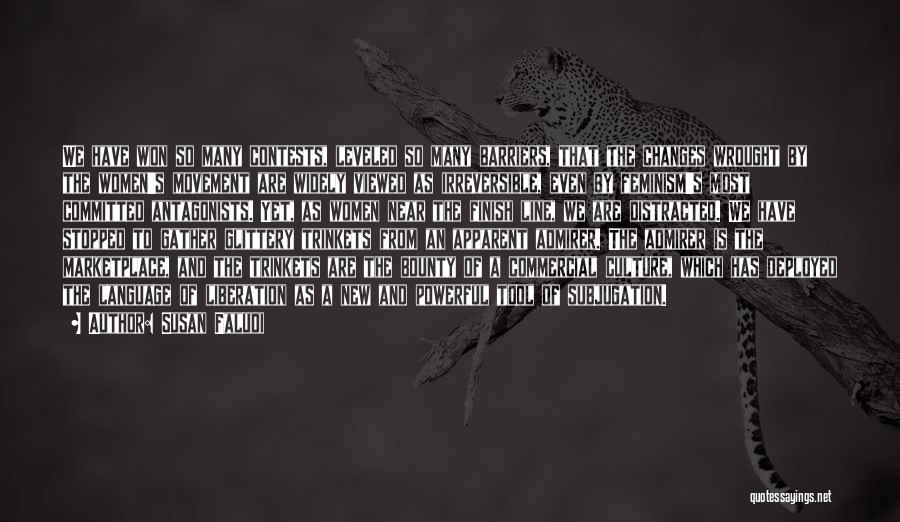
We have won so many contests, leveled so many barriers, that the changes wrought by the women's movement are widely viewed as irreversible, even by feminism's most committed antagonists. Yet, as women near the finish line, we are distracted. We have stopped to gather glittery trinkets from an apparent admirer. The admirer is the marketplace, and the trinkets are the bounty of a commercial culture, which has deployed the language of liberation as a new and powerful tool of subjugation. — Susan Faludi
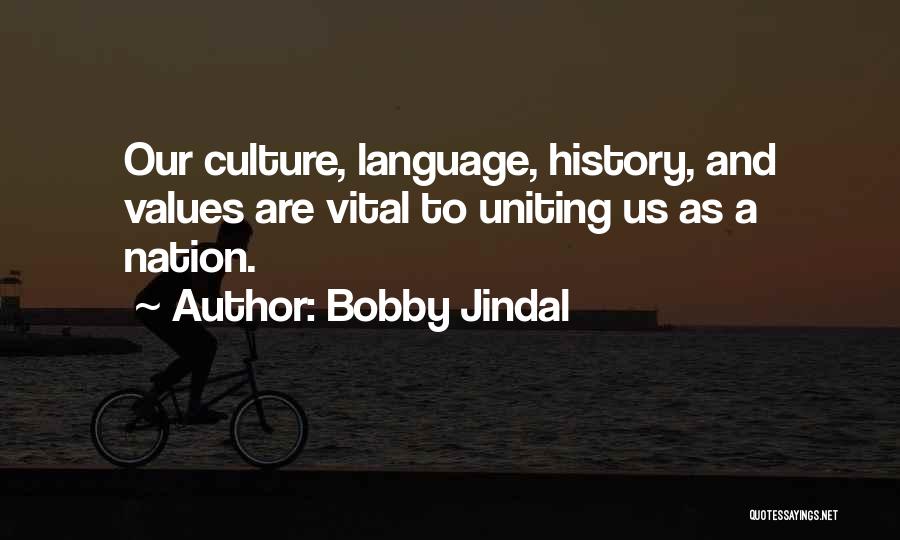
Our culture, language, history, and values are vital to uniting us as a nation. — Bobby Jindal

An accurate accent is powerful because it is the ultimate gesture of empathy. It connects you to another person's culture in a way that words never can, because you have bent your body as well as your mind to match that person's culture. Anyone can learn "bawn-JURE" in a few seconds. To learn how bonjour fits your companion's mouth and tongue; to learn how to manipulate the muscles, the folds, and even the texture of your throat and lips to match your companion's -- this is an unmistakable, undeniable, and irresistable gesture of care. — Gabriel Wyner
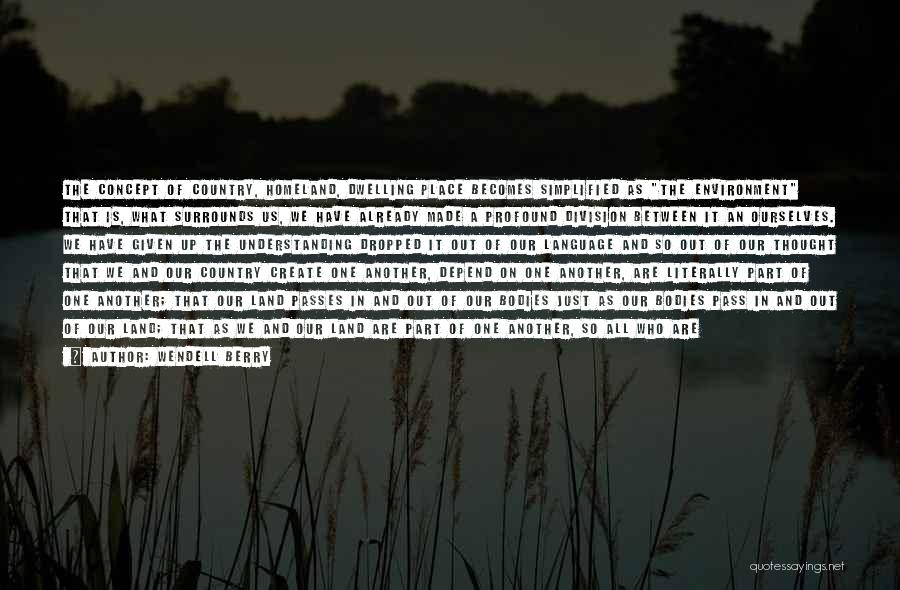
The concept of country, homeland, dwelling place becomes simplified as "the environment"
that is, what surrounds us, we have already made a profound division between it an ourselves. We have given up the understanding
dropped it out of our language and so out of our thought
that we and our country create one another, depend on one another, are literally part of one another; that our land passes in and out of our bodies just as our bodies pass in and out of our land; that as we and our land are part of one another, so all who are living as neighbors here, human and plant and animal, are part of one another, and so cannot possibly flourish alone; that, therefore, our culture must be our response to our place, our culture and our place are images of each other and inseparable from each other, and so neither can be better than they other. — Wendell Berry
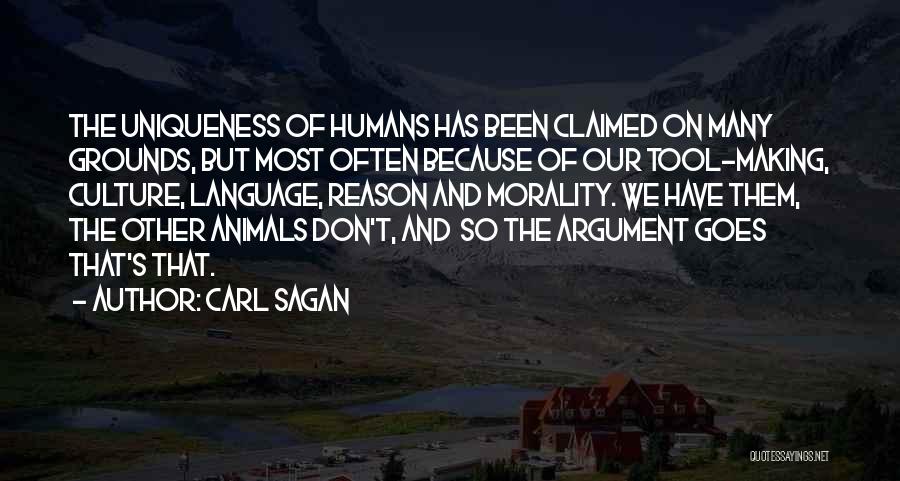
The uniqueness of humans has been claimed on many grounds, but most often because of our tool-making, culture, language, reason and morality. We have them, the other animals don't, and
so the argument goes
that's that. — Carl Sagan

I think the best part of learning a language is that you can see the country's culture through the language. And it gives you different levels of understanding of that culture when you really try to dig in and learn it. — Mark Lippert
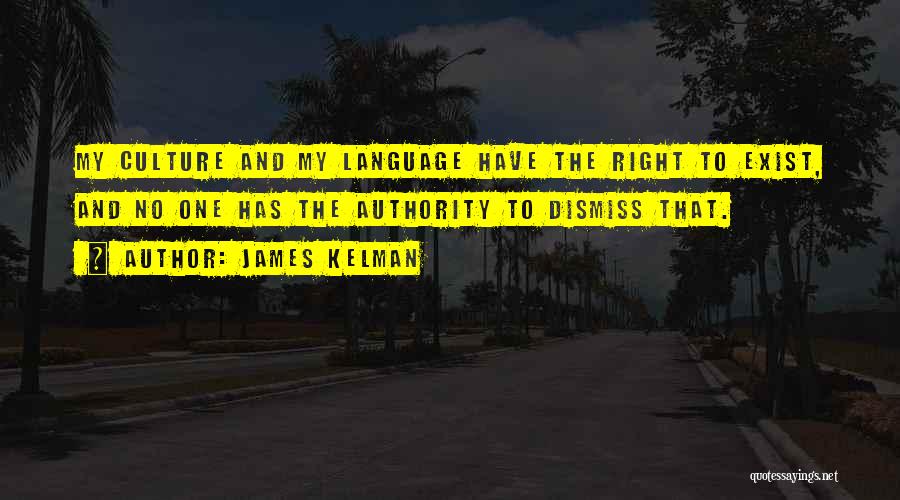
My culture and my language have the right to exist, and no one has the authority to dismiss that. — James Kelman
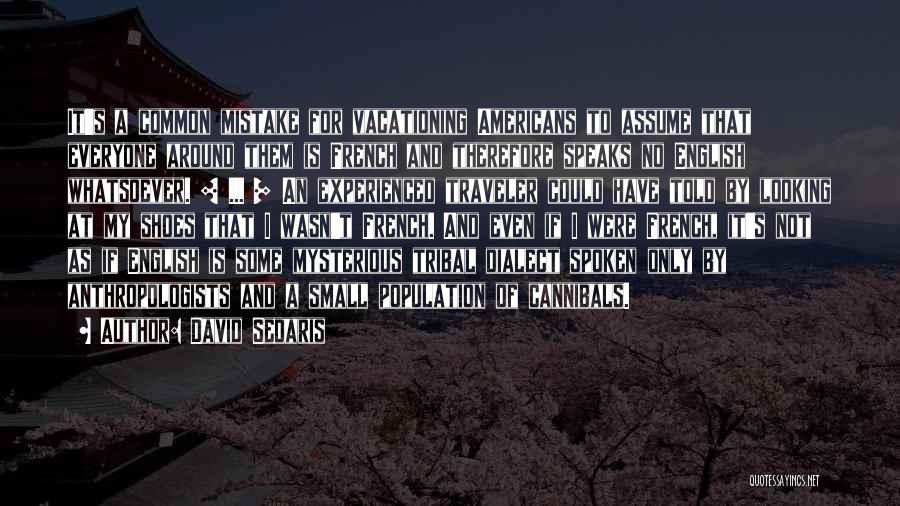
It's a common mistake for vacationing Americans to assume that everyone around them is French and therefore speaks no English whatsoever. [ ... ] An experienced traveler could have told by looking at my shoes that I wasn't French. And even if I were French, it's not as if English is some mysterious tribal dialect spoken only by anthropologists and a small population of cannibals. — David Sedaris
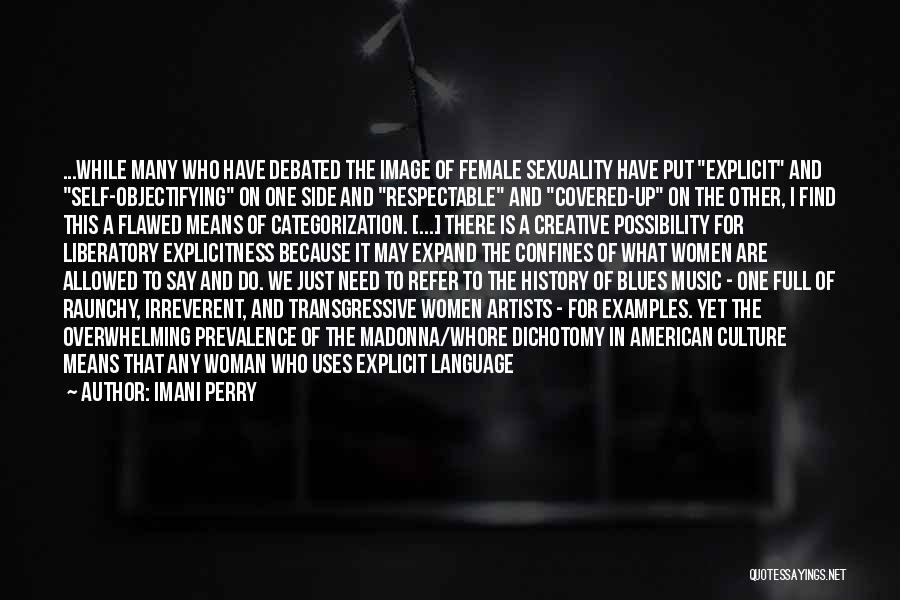
...While many who have debated the image of female sexuality have put "explicit" and "self-objectifying" on one side and "respectable" and "covered-up" on the other, I find this a flawed means of categorization. [...] There is a creative possibility for liberatory explicitness because it may expand the confines of what women are allowed to say and do. We just need to refer to the history of blues music - one full of raunchy, irreverent, and transgressive women artists - for examples. Yet the overwhelming prevalence of the Madonna/whore dichotomy in American culture means that any woman who uses explicit language or images in her creative expression is in danger of being symbolically cast into the role of whore regardless of what liberatory intentions she may have. — Imani Perry
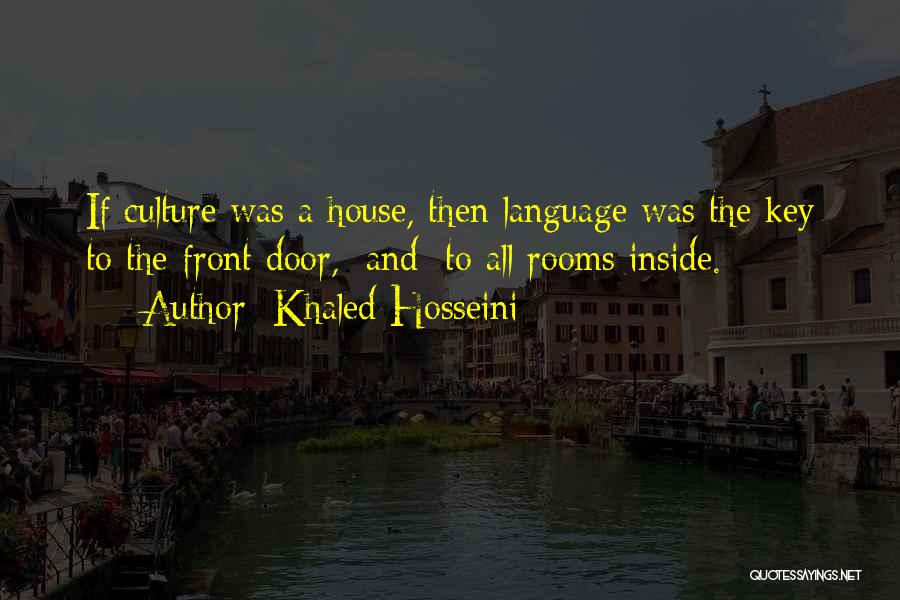
If culture was a house, then language was the key to the front door, [and] to all rooms inside. — Khaled Hosseini
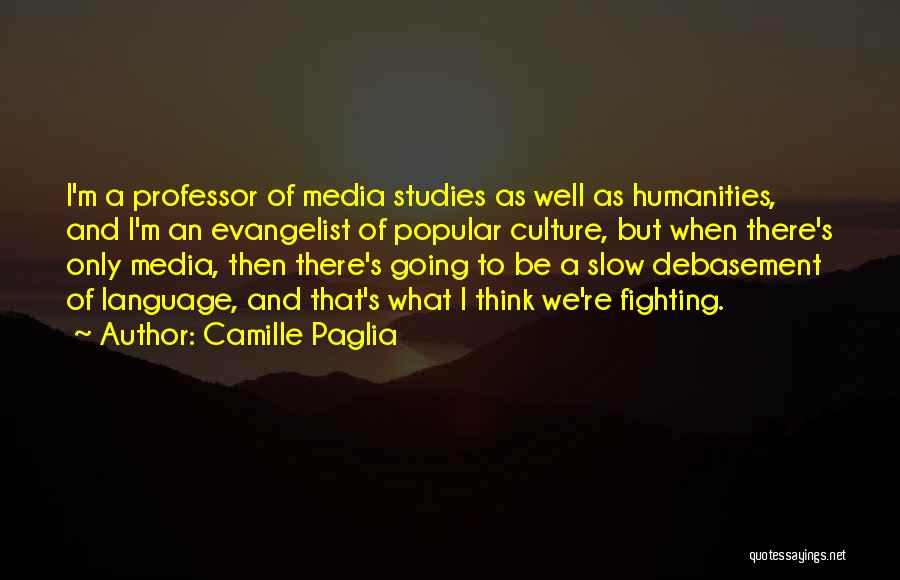
I'm a professor of media studies as well as humanities, and I'm an evangelist of popular culture, but when there's only media, then there's going to be a slow debasement of language, and that's what I think we're fighting. — Camille Paglia
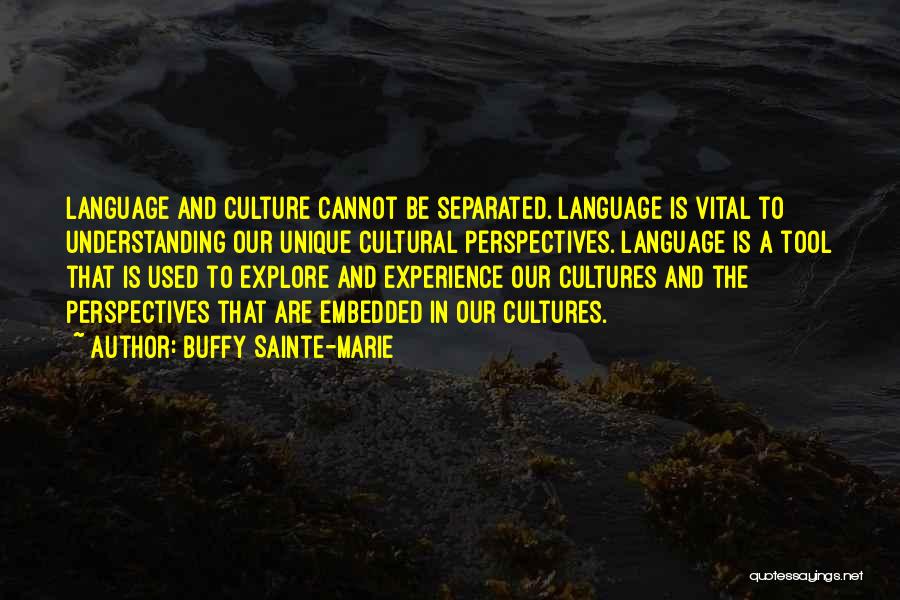
Language and culture cannot be separated. Language is vital to understanding our unique cultural perspectives. Language is a tool that is used to explore and experience our cultures and the perspectives that are embedded in our cultures. — Buffy Sainte-Marie

To understand our world, we must use a revolving globe and look at the earth from various vantage points. If we do so, we will see that the Atlantic is but a bridge linking the colorful, tropical Afro-Latin American world, whose strong ethnic and cultural bonds have been preserved to this day. For a Cuban who arrives in Angola, neither the climate, nor the landscape, nor the food are strange. For a Brazilian, even the language is the same. — Ryszard Kapuscinski

More than sixty years ago we instituted floating citizenship, so children of mixed parents would not be compelled to choose between several equal fatherlands. It was not the end of our countries. Almost everyone still prefers to have a homeland to love and return to, and the legal possibility of life without a homeland does not destroy the bonds of culture, language, and history which make a homeland home. — Ada Palmer
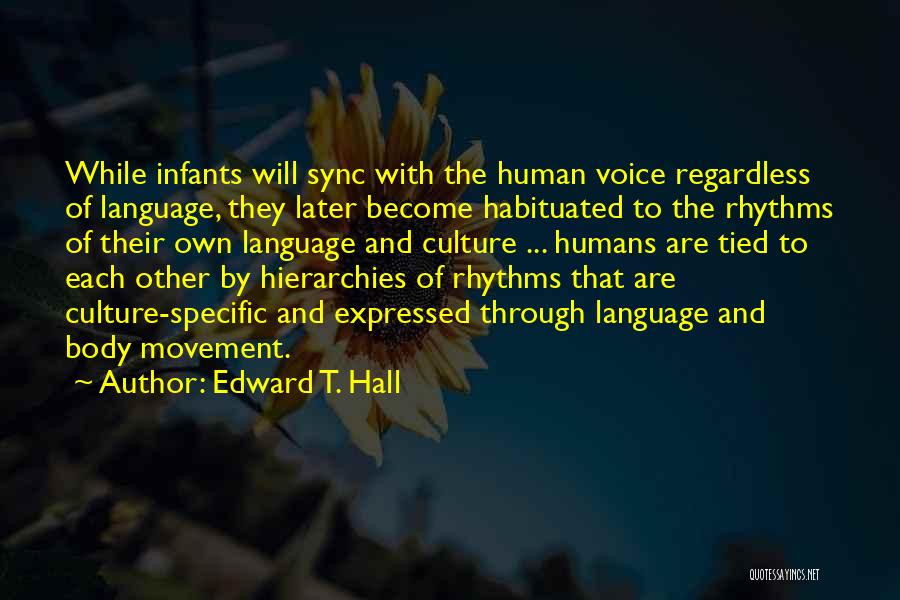
While infants will sync with the human voice regardless of language, they later become habituated to the rhythms of their own language and culture ... humans are tied to each other by hierarchies of rhythms that are culture-specific and expressed through language and body movement. — Edward T. Hall
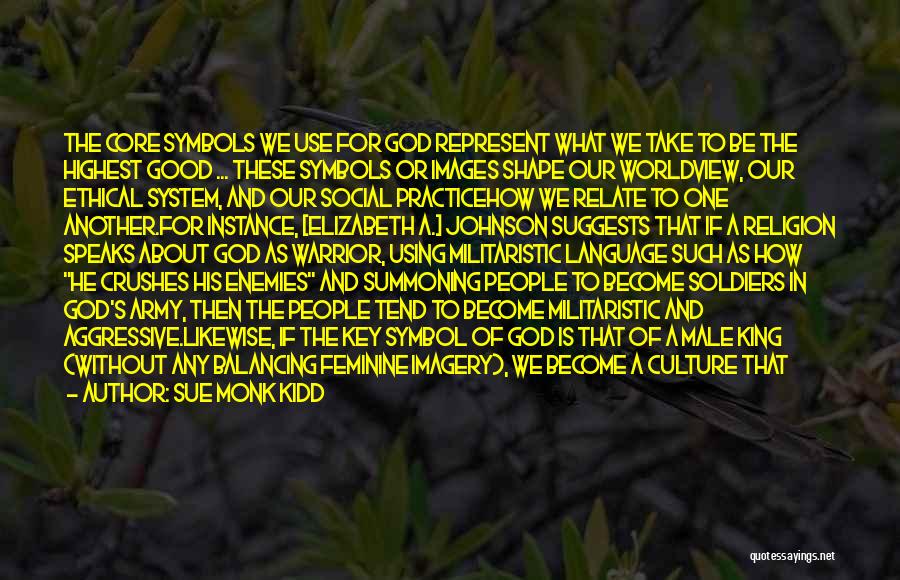
The core symbols we use for God represent what we take to be the highest good ... These symbols or images shape our worldview, our ethical system, and our social practice
how we relate to one another.
For instance, [Elizabeth A.] Johnson suggests that if a religion speaks about God as warrior, using militaristic language such as how "he crushes his enemies" and summoning people to become soldiers in God's army, then the people tend to become militaristic and aggressive.
Likewise, if the key symbol of God is that of a male king (without any balancing feminine imagery), we become a culture that values and enthrones men and masculinity. — Sue Monk Kidd
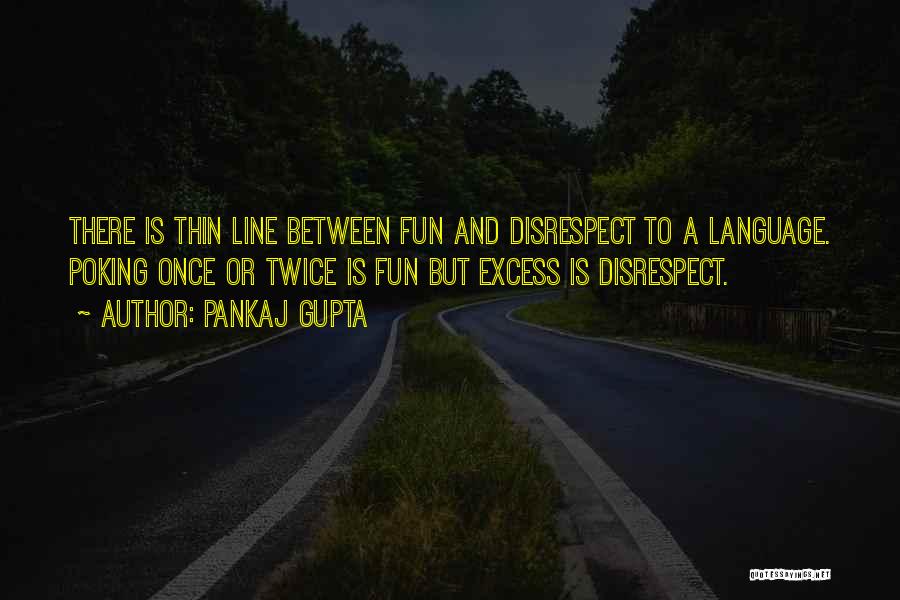
There is thin line between fun and disrespect to a language. Poking once or twice is fun but excess is disrespect. — Pankaj Gupta
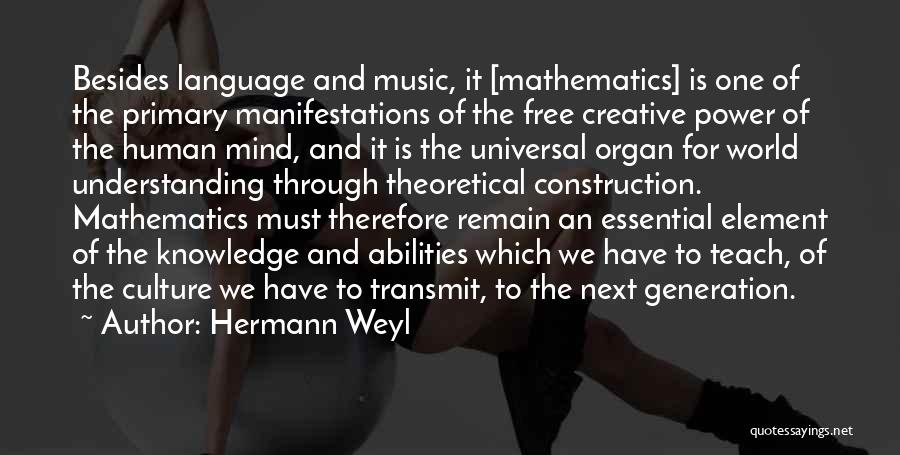
Besides language and music, it [mathematics] is one of the primary manifestations of the free creative power of the human mind, and it is the universal organ for world understanding through theoretical construction. Mathematics must therefore remain an essential element of the knowledge and abilities which we have to teach, of the culture we have to transmit, to the next generation. — Hermann Weyl
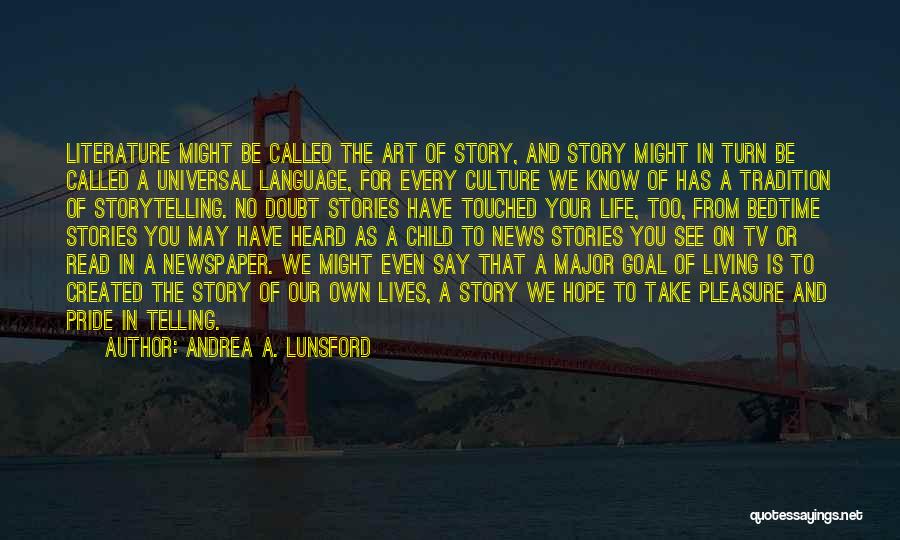
Literature might be called the art of story, and story might in turn be called a universal language, for every culture we know of has a tradition of storytelling. No doubt stories have touched your life, too, from bedtime stories you may have heard as a child to news stories you see on TV or read in a newspaper. We might even say that a major goal of living is to created the story of our own lives, a story we hope to take pleasure and pride in telling. — Andrea A. Lunsford
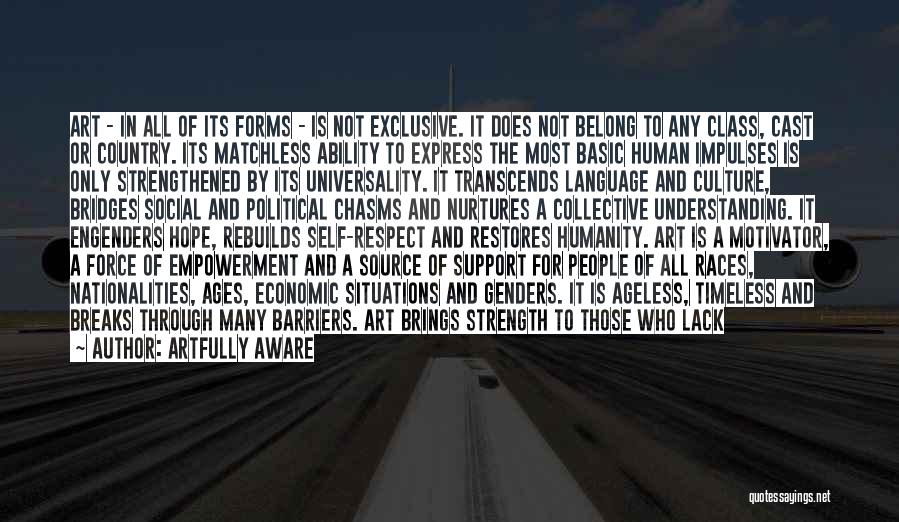
Art - in all of its forms - is not exclusive. It does not belong to any class, cast or country. Its matchless ability to express the most basic human impulses is only strengthened by its universality. It transcends language and culture, bridges social and political chasms and nurtures a collective understanding. It engenders hope, rebuilds self-respect and restores humanity. Art is a motivator, a force of empowerment and a source of support for people of all races, nationalities, ages, economic situations and genders. It is ageless, timeless and breaks through many barriers. Art brings strength to those who lack confidence, wish for a mental escape from harsh environments or who seek to restore happiness and hope in times of great need." Artfully AWARE 5 — Artfully Aware

Christian monks and nuns were, in effect, the guardians of culture, as they were virtually the only people who could read and write before the fourteenth century. It is interesting therefore that most of the native English culture they preserved is not in Latin, the language of the church, but in Old English, the language of the Angles, Saxons, and Jutes. — Ronald Carter
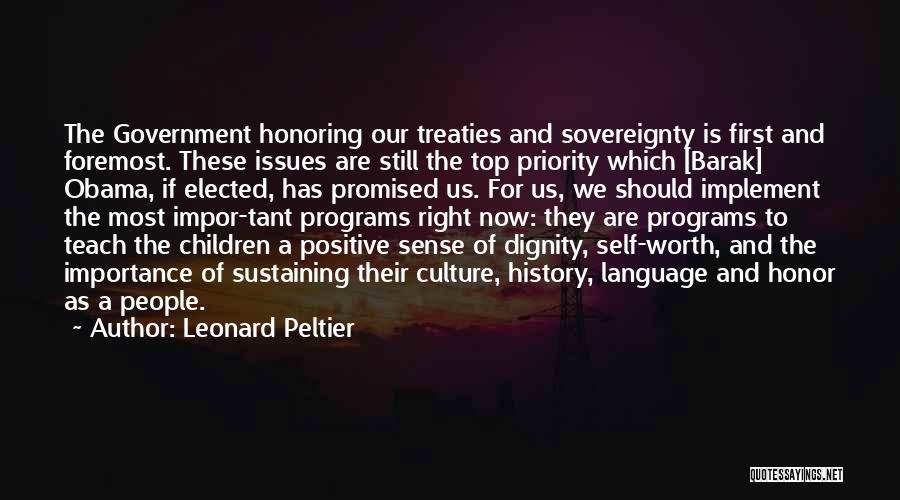
The Government honoring our treaties and sovereignty is first and foremost. These issues are still the top priority which [Barak] Obama, if elected, has promised us. For us, we should implement the most impor-tant programs right now: they are programs to teach the children a positive sense of dignity, self-worth, and the importance of sustaining their culture, history, language and honor as a people. — Leonard Peltier
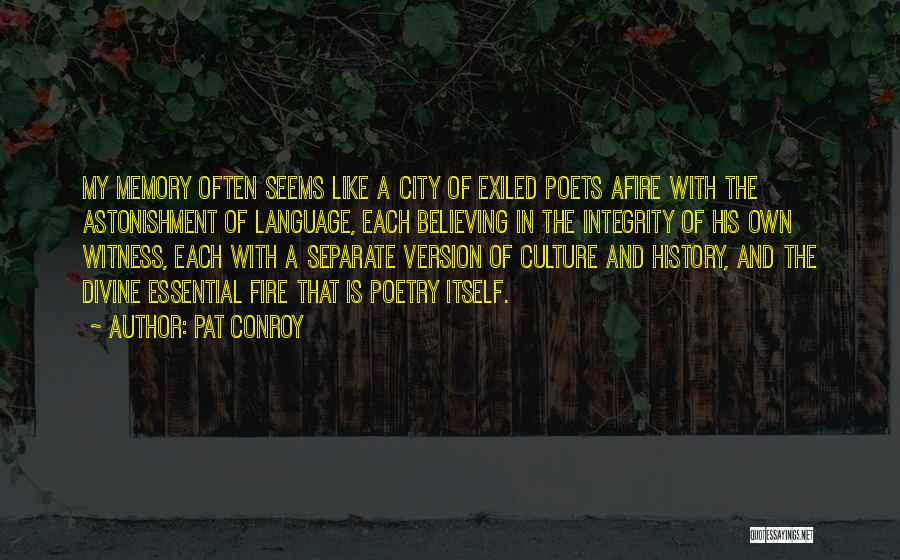
My memory often seems like a city of exiled poets afire with the astonishment of language, each believing in the integrity of his own witness, each with a separate version of culture and history, and the divine essential fire that is poetry itself. — Pat Conroy
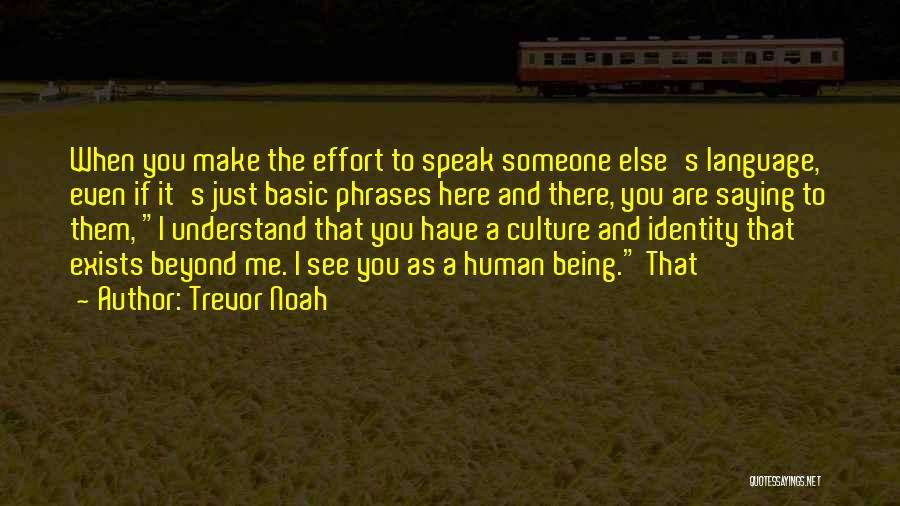
When you make the effort to speak someone else's language, even if it's just basic phrases here and there, you are saying to them, "I understand that you have a culture and identity that exists beyond me. I see you as a human being." That — Trevor Noah
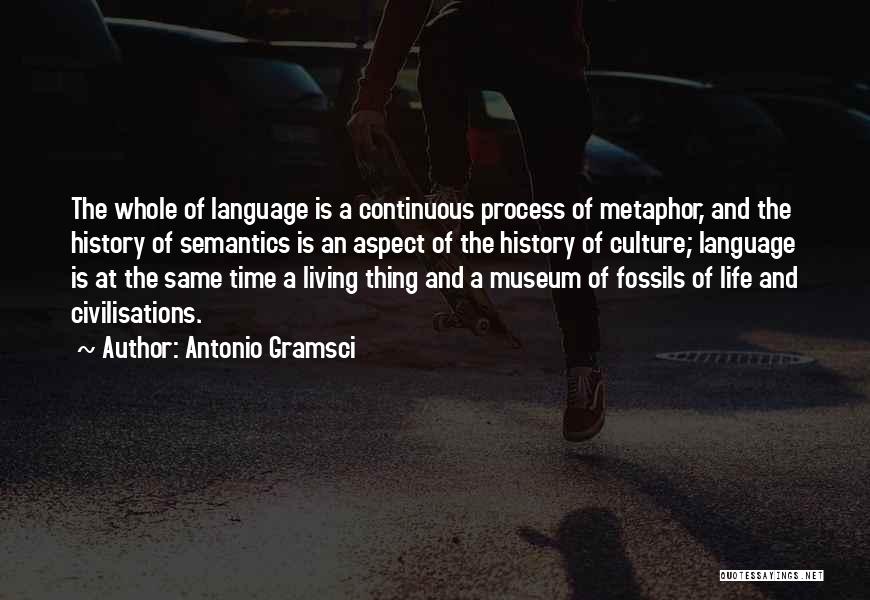
The whole of language is a continuous process of metaphor, and the history of semantics is an aspect of the history of culture; language is at the same time a living thing and a museum of fossils of life and civilisations. — Antonio Gramsci
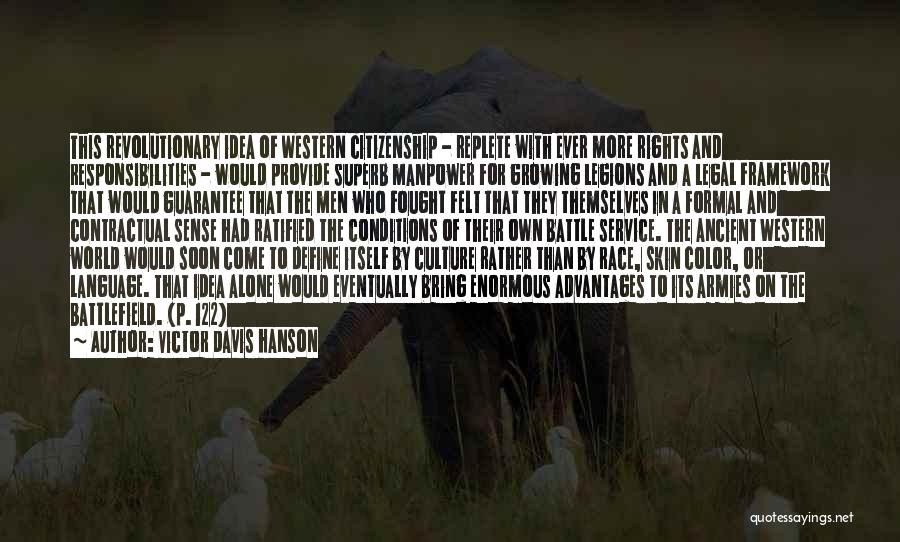
This revolutionary idea of Western citizenship - replete with ever more rights and responsibilities - would provide superb manpower for growing legions and a legal framework that would guarantee that the men who fought felt that they themselves in a formal and contractual sense had ratified the conditions of their own battle service. The ancient Western world would soon come to define itself by culture rather than by race, skin color, or language. That idea alone would eventually bring enormous advantages to its armies on the battlefield. (p. 122) — Victor Davis Hanson
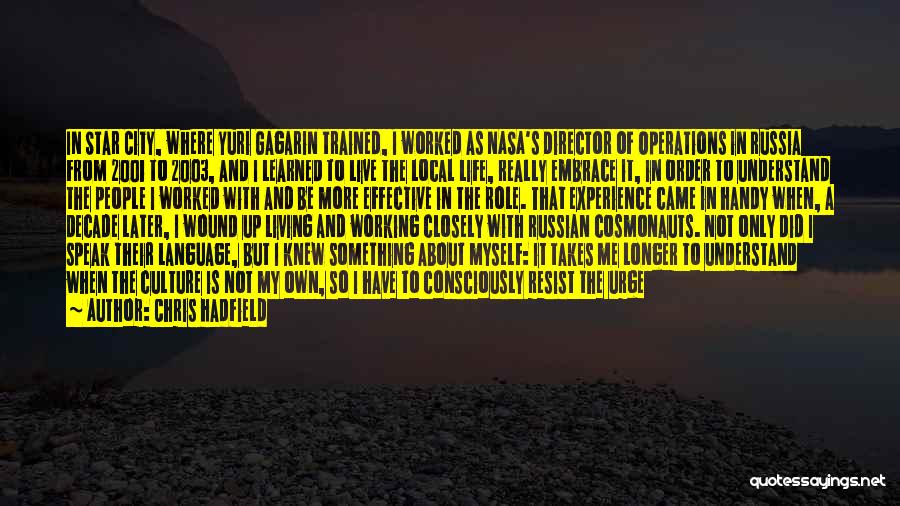
In Star City, where Yuri Gagarin trained, I worked as NASA's Director of Operations in Russia from 2001 to 2003, and I learned to live the local life, really embrace it, in order to understand the people I worked with and be more effective in the role. That experience came in handy when, a decade later, I wound up living and working closely with Russian cosmonauts. Not only did I speak their language, but I knew something about myself: it takes me longer to understand when the culture is not my own, so I have to consciously resist the urge to hurry things along and push my own expectations on others. — Chris Hadfield
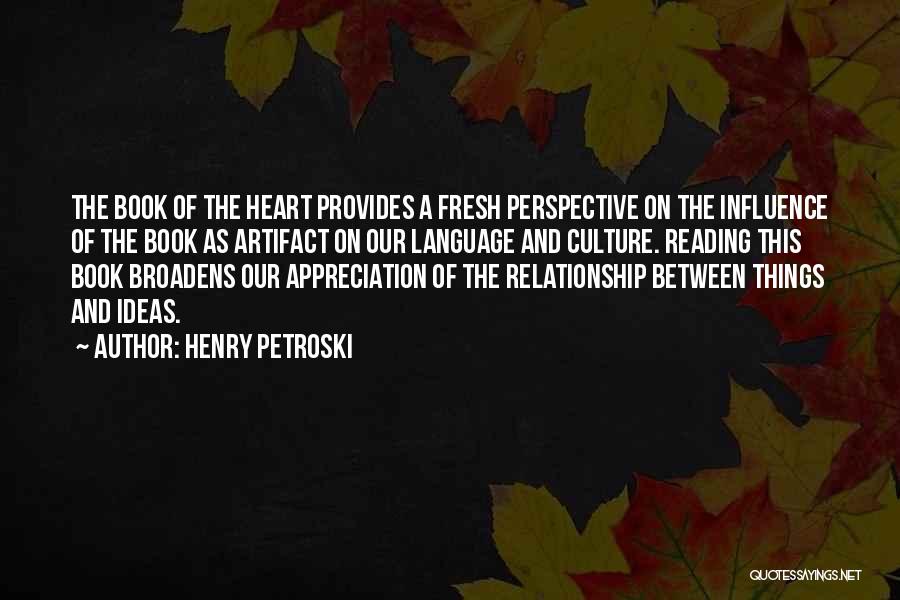
The Book of the Heart provides a fresh perspective on the influence of the book as artifact on our language and culture. Reading this book broadens our appreciation of the relationship between things and ideas. — Henry Petroski
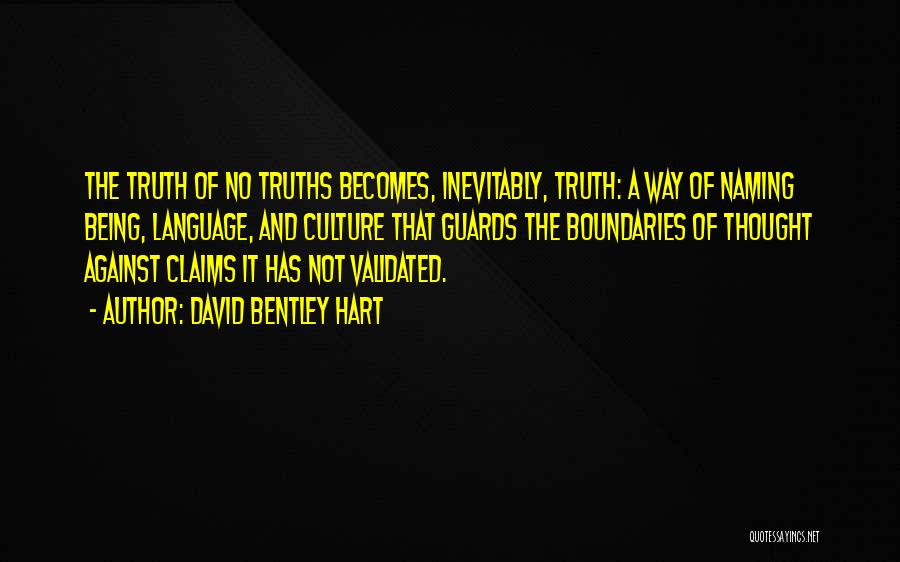
The truth of no truths becomes, inevitably, truth: a way of naming being, language, and culture that guards the boundaries of thought against claims it has not validated. — David Bentley Hart

For humanism also appeals to man as man. It seeks to liberate the universal qualities of human nature from the narrow limitations of blood and soil and class and to create a common language and a common culture in which men can realize their common humanity. — Christopher Dawson
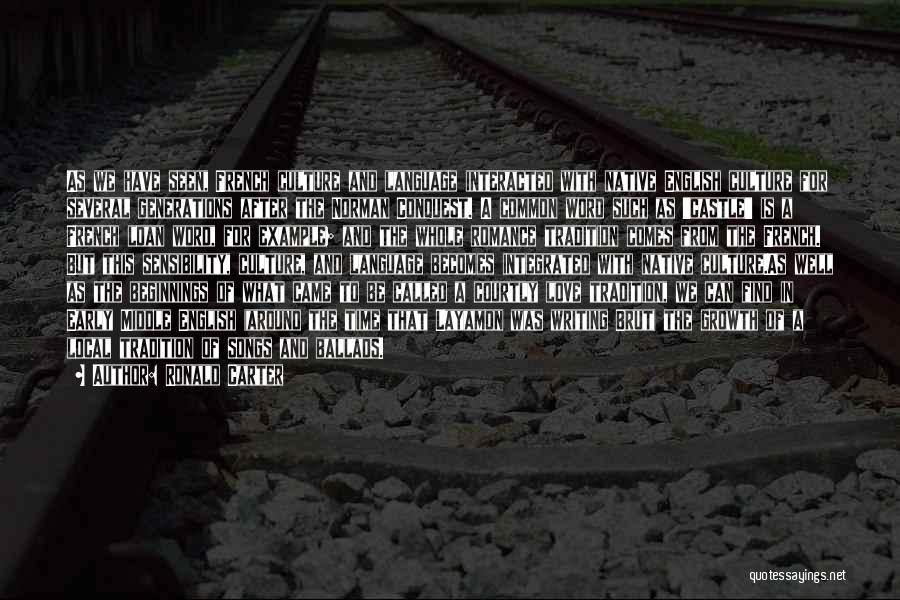
As we have seen, French culture and language interacted with native English culture for several generations after the Norman Conquest. A common word such as 'castle' is a French loan word, for example; and the whole romance tradition comes from the French. But this sensibility, culture, and language becomes integrated with native culture.
As well as the beginnings of what came to be called a courtly love tradition, we can find in Early Middle English (around the time that Layamon was writing Brut) the growth of a local tradition of songs and ballads. — Ronald Carter

Few people ... have had much training in listening. The training of most oververbalized professional intellectuals is in the opposite direction. Living in a competitive culture, most of us are most of the time chiefly concerned with getting our own views across, and we tend to find other people's speeches a tedious interruption of the flow of our own ideas. — S.I. Hayakawa
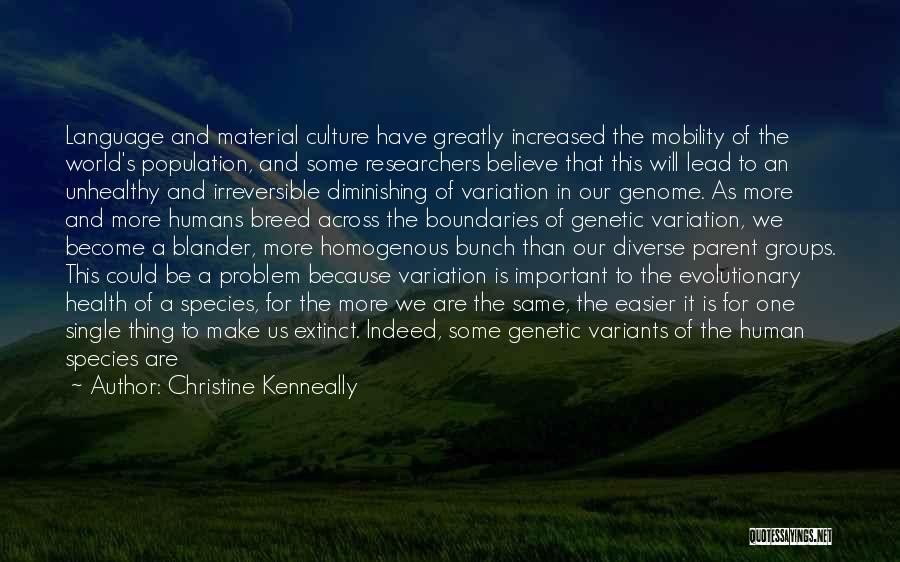
Language and material culture have greatly increased the mobility of the world's population, and some researchers believe that this will lead to an unhealthy and irreversible diminishing of variation in our genome. As more and more humans breed across the boundaries of genetic variation, we become a blander, more homogenous bunch than our diverse parent groups. This could be a problem because variation is important to the evolutionary health of a species, for the more we are the same, the easier it is for one single thing to make us extinct. Indeed, some genetic variants of the human species are disappearing altogether as small indigenous groups die out. — Christine Kenneally
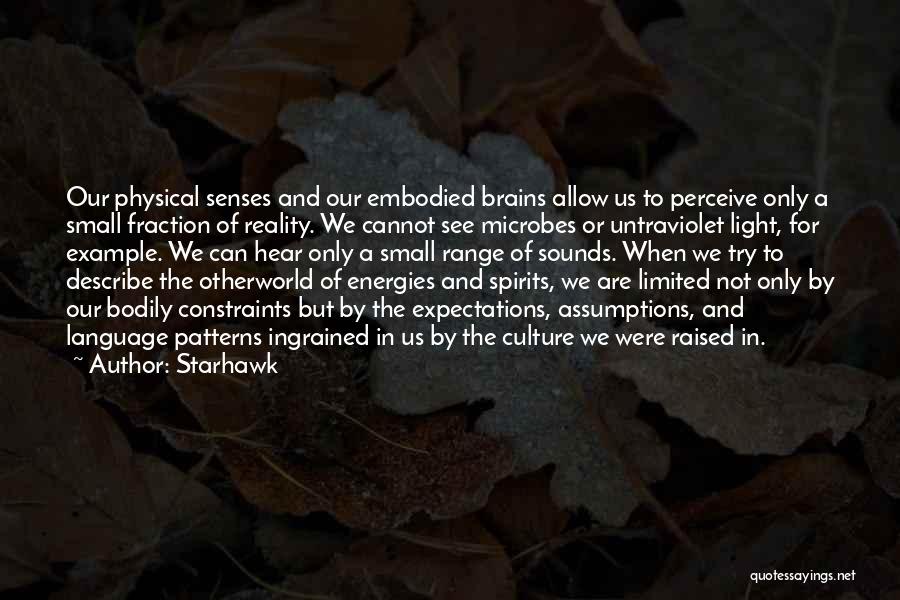
Our physical senses and our embodied brains allow us to perceive only a small fraction of reality. We cannot see microbes or untraviolet light, for example. We can hear only a small range of sounds. When we try to describe the otherworld of energies and spirits, we are limited not only by our bodily constraints but by the expectations, assumptions, and language patterns ingrained in us by the culture we were raised in. — Starhawk

An immune system of enormous complexity is present in all vertebrate animals. When we place a population of lymphocytes from such an animal in appropriate tissue culture fluid, and when we add an antigen, the lymphocytes will produce specific antibody molecules, in the absense of any nerve cells. I find it astonishing that the immune system embodies a degree of complexity which suggests some more or less superficial though striking analogies with human language, and that this cognitive system has evolved and functions without assistance of the brain. — Niels Kaj Jerne
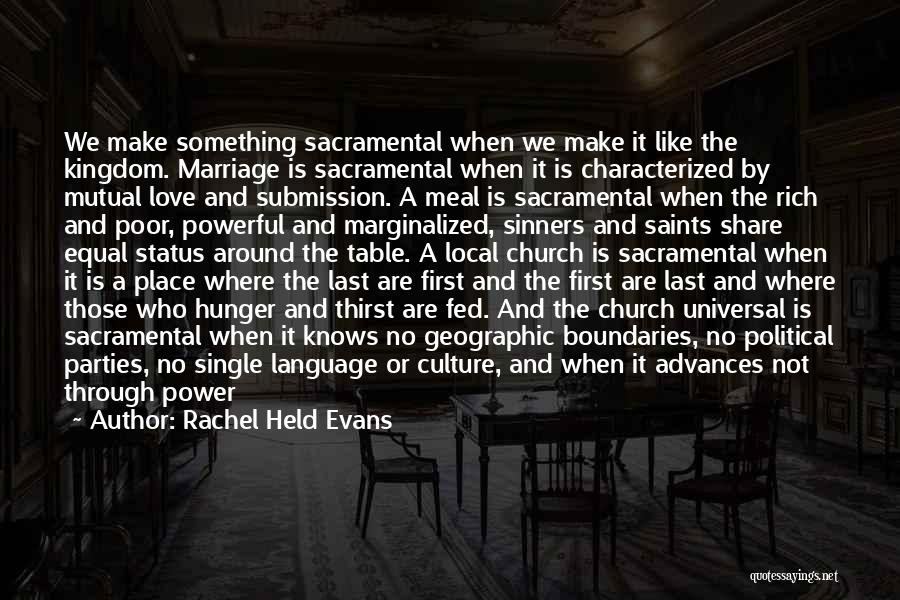
We make something sacramental when we make it like the kingdom. Marriage is sacramental when it is characterized by mutual love and submission. A meal is sacramental when the rich and poor, powerful and marginalized, sinners and saints share equal status around the table. A local church is sacramental when it is a place where the last are first and the first are last and where those who hunger and thirst are fed. And the church universal is sacramental when it knows no geographic boundaries, no political parties, no single language or culture, and when it advances not through power and might, but through acts of love, joy, and peace and missions of mercy, kindness, humility. — Rachel Held Evans
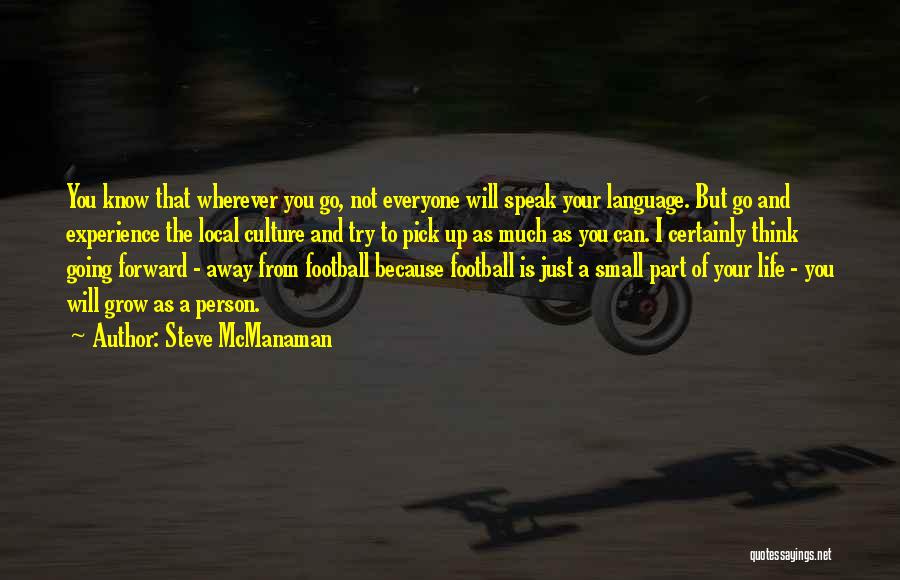
You know that wherever you go, not everyone will speak your language. But go and experience the local culture and try to pick up as much as you can. I certainly think going forward - away from football because football is just a small part of your life - you will grow as a person. — Steve McManaman
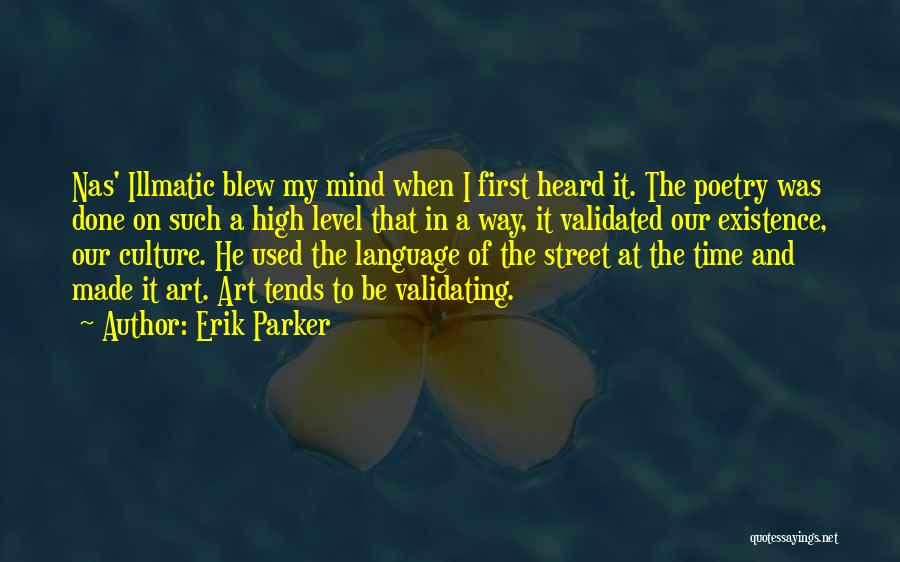
Nas' Illmatic blew my mind when I first heard it. The poetry was done on such a high level that in a way, it validated our existence, our culture. He used the language of the street at the time and made it art. Art tends to be validating. — Erik Parker
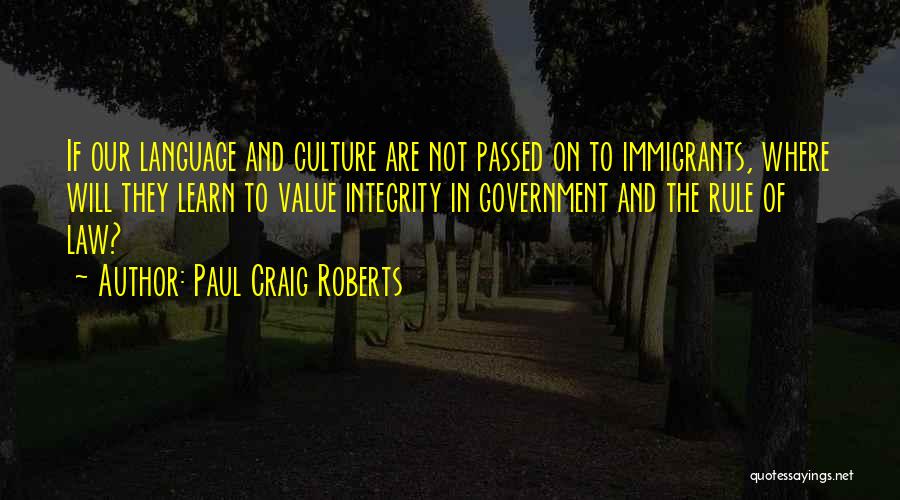
If our language and culture are not passed on to immigrants, where will they learn to value integrity in government and the rule of law? — Paul Craig Roberts
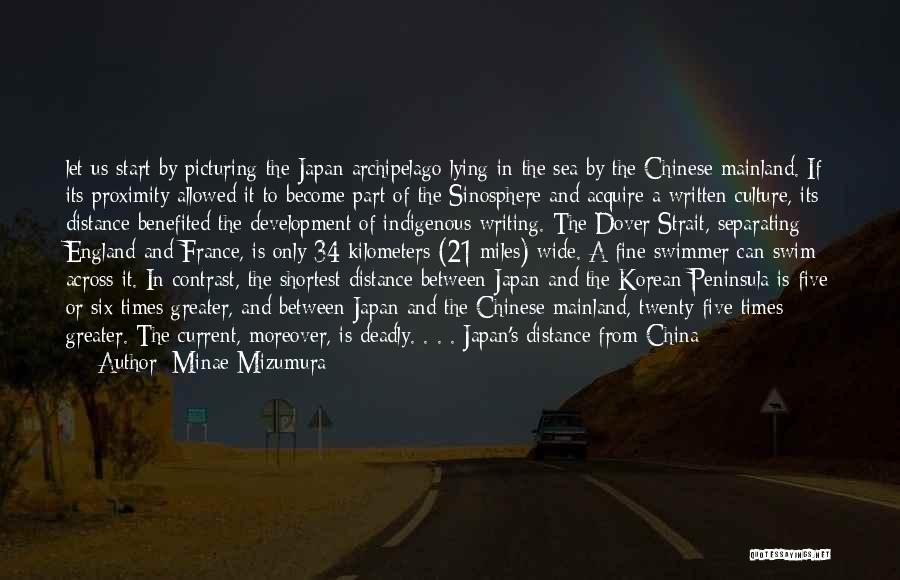
let us start by picturing the Japan archipelago lying in the sea by the Chinese mainland. If its proximity allowed it to become part of the Sinosphere and acquire a written culture, its distance benefited the development of indigenous writing. The Dover Strait, separating England and France, is only 34 kilometers (21 miles) wide. A fine swimmer can swim across it. In contrast, the shortest distance between Japan and the Korean Peninsula is five or six times greater, and between Japan and the Chinese mainland, twenty-five times greater. The current, moreover, is deadly. . . . Japan's distance from China gave it political and cultural freedom and made possible the flowering of its own writing. — Minae Mizumura
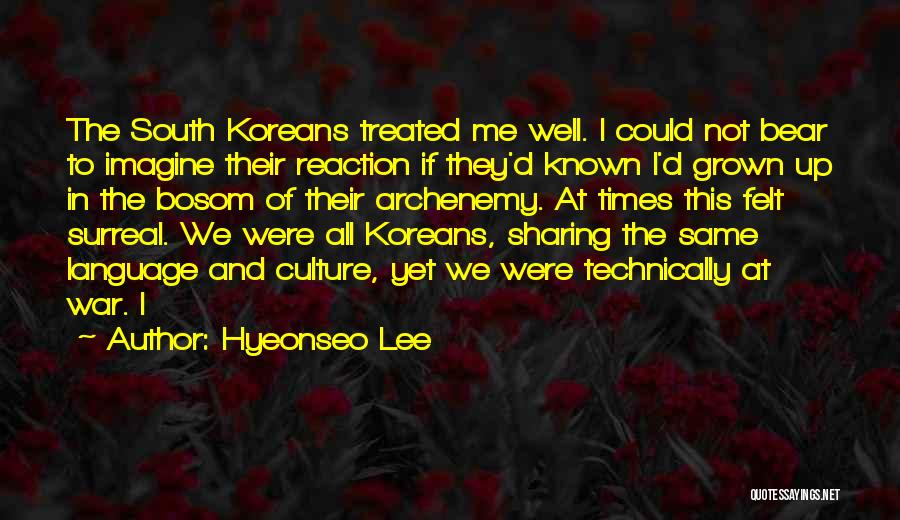
The South Koreans treated me well. I could not bear to imagine their reaction if they'd known I'd grown up in the bosom of their archenemy. At times this felt surreal. We were all Koreans, sharing the same language and culture, yet we were technically at war. I — Hyeonseo Lee

The problem with the word "vagina" is that vaginas seem to be just straight-out bad luck. Only a masochist would want one, because only awful things happen to them. Vaginas get torn. Vaginas get "examined.".. No. Let's clear this up right now - I don't actually have a vagina. I never have. I, personally, have a cunt. Cunt is a proper, old, historic, strong word, and it doubles up as the most potent swear word in the English language. Yeah. That's how powerful it is, guys. If I tell you what I've got down there, old ladies and clerics might faint. I like how shocked people are when you say "cunt." Compared to this, the most powerful swear word men have got out of their privates is "dick," which is frankly vanilla. In a culture where nearly everything female is still seen as squeam-inducing and/or weak - menstruation, menopause, just the sheer, simple act of calling someone "a girl" - I love that "cunt" stands on its own, as the supreme, unvanquishable word. — Caitlin Moran

If you respect a language and culture, it shows in your work. — A.R. Rahman

In societies reduced to blur and glut, terror is the only meaningful act. There's too much everything, more things and messages and meanings that we can use in ten thousand lifetimes. Inertia-hysteria. Is history possible? Is anyone serious? Who do we take serious? Only the lethal believer, the person who kills and dies for faith. Everything else is absorbed. The artist is absorbed, the madman in the street is absorbed an processed and incorporated. Give him a dollar, put him in a TV commercial. Only the terrorists stand outside. The culture hasn't figured out how to assimilate him. It's confusing when they kill the innocent. But this is precisely the language of being noticed, the only language the West understands. The way they determine how we see them. The way they dominate the rush of endless streaming images. — Don DeLillo
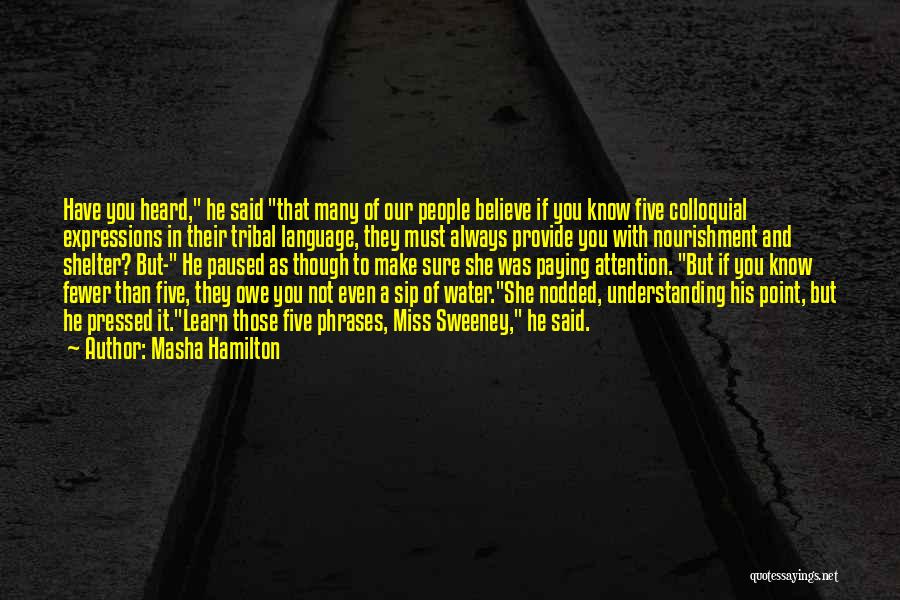
Have you heard," he said "that many of our people believe if you know five colloquial expressions in their tribal language, they must always provide you with nourishment and shelter? But-" He paused as though to make sure she was paying attention. "But if you know fewer than five, they owe you not even a sip of water."
She nodded, understanding his point, but he pressed it.
"Learn those five phrases, Miss Sweeney," he said. — Masha Hamilton
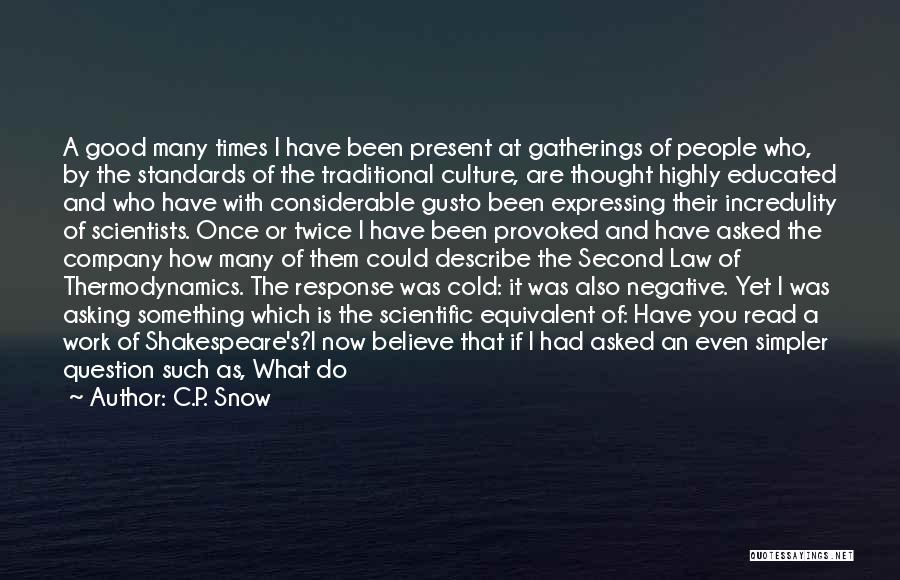
A good many times I have been present at gatherings of people who, by the standards of the traditional culture, are thought highly educated and who have with considerable gusto been expressing their incredulity of scientists. Once or twice I have been provoked and have asked the company how many of them could describe the Second Law of Thermodynamics. The response was cold: it was also negative. Yet I was asking something which is the scientific equivalent of: Have you read a work of Shakespeare's?
I now believe that if I had asked an even simpler question
such as, What do you mean by mass, or acceleration, which is the scientific equivalent of saying, Can you read?
not more than one in ten of the highly educated would have felt that I was speaking the same language. So the great edifice of modern physics goes up, and the majority of the cleverest people in the western world have about as much insight into it as their neolithic ancestors would have had. — C.P. Snow
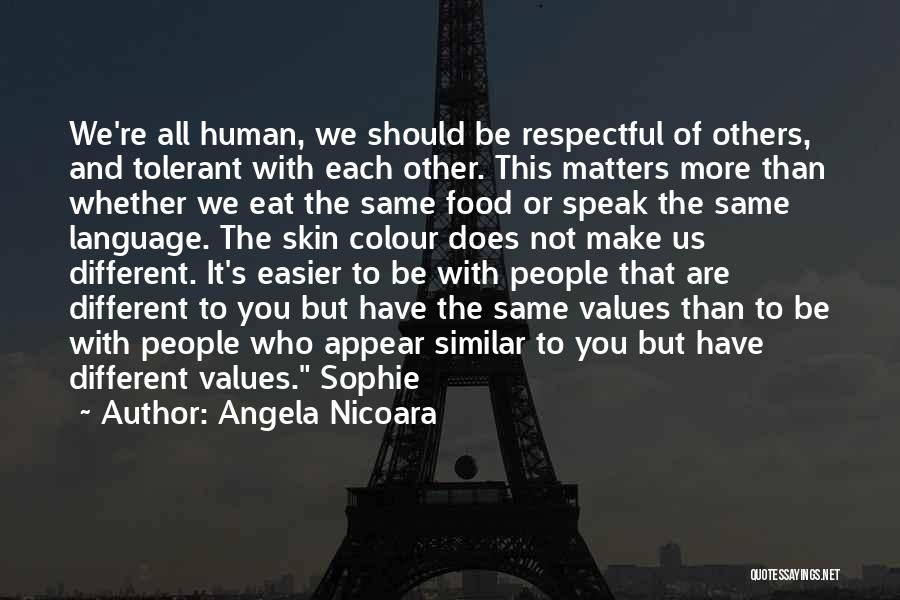
We're all human, we should be respectful of others, and tolerant with each other. This matters more than whether we eat the same food or speak the same language. The skin colour does not make us different. It's easier to be with people that are different to you but have the same values than to be with people who appear similar to you but have different values." Sophie — Angela Nicoara





